Thursday, 02 May 2024
Organic supermarkets can be found on almost every second street corner in Munich but density varies from neighbourhood to neighbourhood.
Organic supermarket chains
In addition to a local organic supermarket chain, Vollcorner (consisting of about twenty markets in Munich and around), Munich hosts several branches of Germany's biggest organic chains Alnatura and Denns (both with more than 10 markets each within the city boundaries). The decline of the Basic chain (see below) which formerly dominated the city centre lead to the opening of a new centrally located Denns supermarket on the premises of a former Lidl branch in May, 2024 (the first Denns supermarket in the city centre did not survive tucked away in the basement of a mall).
Until mid of 2023 Munich was the home of the Basic supermarket chain with 11 markets – early in 2021 this chain restricted its activities to South Germany and Austria and sold all other nation-wide branches. However, these measures
did not stop the decline of the company driven by management failures,
resulting in an insolvency. The Munich shops were taken over by the conventional
supermarket chain
teGut. Under the
new management
only the original Basic shop near Isartor and a second one near Nordbad are surviving as organic supermarkets, at least until the end of 2024. After this
grace period the company plans to evaluate whether 100 percent organic supermarkets will be part of their concept. The bakery and butchers' counters inside the former Basic headquarter in Bogenhausen are still 100 percent organic as is its greengrocers' section.
TeGut is not the first conventional full retailer experimenting with fully organic supermarkets: With the Naturkind supermarket in Harlaching the Edeka co-operative is also running an experimental organic supermarkt in Munich, their first and only in town.
With Basic on the verge, there are two regional full retail chains left in town:
Landmann's with branches in several Bavarian
towns, but only one within the Munich city boundaries (including an artisanal butcher's counter run by the Biometzgerei Pichler), and Vollcorner
which does not have branches outside the Munich S-Bahn network. In addition
there are still
many small independent supermarkets, often using a Biomarkt sign, and even some homely, surviving corner shops.
Vollcorner has been making notable efforts to support zero-waste shopping for a long time, and burried many of them due to low customer acceptance. Shopping here you can however be sure not to (indirectly) support huge, globally operating multinational concerns as Vollcorner consistently delists organic brands sold to such companies. So you will find neither Logocos brands (Logona, Lenz, Sante, Heliotrop, Fitne) anymore since the company was bought by L'Oreal (which is partially owned by Nestle), nor Pukka tea (Unilever). Wine-lovers may also collect the corks made from natural cork and return them for recycling at any Vollcorner shop.
On weekdays most organic supermarkets keep open between 9 am and 8 pm, Vollcorner markets open at 8 am. Saturday opening hours vary, the big retailers and Vollcorner close at 8 pm. All groceries except
the Biokultur supermarket in the basement of the central train station are closed on Sundays.
Apart from these full range retailers there is a small local food only chain, not offering any toiletries or detergents: Herrmannsdorfer specialises in meat products, bakery items and beer produced in the Herrmannsdorfer Landwerkstätten in Glonn, somewhat outside Munich. The shops close quite early, but if you come during daytime they stock sufficient dry food, dairy products, fruits, veges, sweets and more to spare you the trip to a second shop. Unlike the Basic chain Herrmannsdorfer allows you to buy meat in your own containers.
In 2015 a branch of the hyped Italian Eataly delicatessen chain opened within the architectonically interesting glass and iron construction of Schrannenhalle near Viktualienmarkt. It's true, they offer a good range of organic products, and organic food items are labelled as such on the shelves, but it's nevertheless a disappointing experience: Almost no fresh organic fruit and veges (not even the fresh herbs are organic), only pre-packaged organic meat (forget about the well-assorted meat counter), and the organic wines and spirits in the basement are not marked "bio" on the shelves, so it's very hard to find them.
Independent full-retailers
If you want to support the local economy, both Vollcorner, Munich-based Basic and Herrmannsdorfer shops are all fine, but you may prefer to support independent markets where the owners are actually running the stores and create a homely and personal atmosphere. Often you will find products not on sale by the big chains.
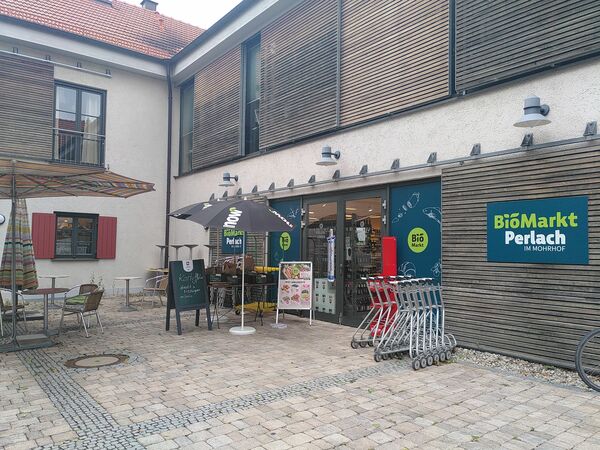
When traditional Grüner Markt chain closed down end of September 2014, their main house in the Altperlach neighbourhood made an exception. Housed in a vault it has a pleasant italophilic, somewhat venerable atmosphere, definitely worth a visit. The perfect surroundings when shopping for delicatessen, and a must-go during the Christmas season. It's now dubbed Mohrhof Perlach.
The other big independent is Schmatz ("smack") in the Glockenbach neighbourhood. Step by if only for the lovely decoration of their bodycare section. Kids are invited to play in an old-fashioned corner shop, and selected items are lovingly set on display. It's the only organic supermarket playing music in the background. By the end of 2018 they issued a ban on fresh herbs in plastics packing, and in 2022 there's a dedicated unpackaged shelf with dry food in deposit glasses.
For the picturesque yet upmarket farmshop feeling in the city aim for Stemmerhof on top of the Sendlinger Berg. Once upon a time a wealthy village farm opposite the village church the nicely restored houses are now the home of an organic supermarket and a range of small owner-run shops. The supermarket's butcher's cum delicatessen disk will happily sell lunch snacks to eat on the spot or to take-away. The same enterprise also runs a second branch in the suburb of Grünwald, just a street crossing opposite of Alter Wirt hotel and restaurant.
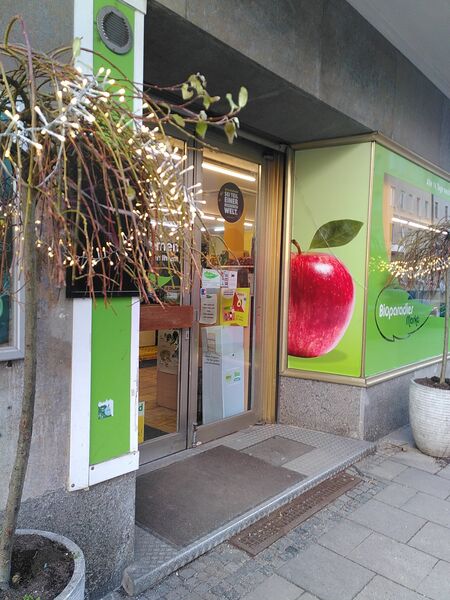
In the posh Lehel neighbourhood near the Eisbach river within the Englischer Garten park you'll find an independent organic supermarket with a touch of a spice and greens bazaar, the Bioparadies Biomarkt. Its friendly staff was even willing to open after closing time, to sell me a left-over bread on a Saturday afternoon. The serviced bakery and cheese counter is also the place to refill your spice jars with loose-weight herbs and spices. The supermarket is conveniently located opposite the tram stop "Paradiesstraße".
The former Erdgarten supermarket a ten-minutes walk away from Pasing train station (or two minutes from Pasing Marienplatz square) reopened as a branch of the local Vollcorner chain September, 2019 and continues to serve organic and vegetarian wholefood lunch as well as coffee and cake. They also have a nicely decorated bodycare section. Whether they'll continue to serve knitters with a fine selection of organic wool I am not aware of.
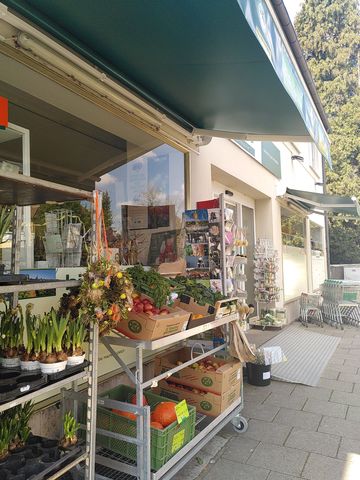
If you by chance happen to strand near the Klinikum Harlaching hospital, don't dispair: two tramstops in North-Eastern direction on the left side (just follow the tram line along Grünwalder Str.) you'll find Biowelt, a crammed independent organic supermarket with a superb selection of both, bodycare and frozen convenience products: All you need if visiting a friend or relative in the hospital in urgent need of a proper meal. Starting with lunch time they offer a helping of organic soup and a small selection of snacks. You may ask for a sandwich made on the spot. The shop also has a zero waste corner with dispensers for legumes and a small selection of other dry food as well as an assortment of dried fruit. Make sure to step by check-out to weigh your containers before you fill them.
Attending a conference at one of the huge Bogenhausen hotels near Effnerplatz? Your lunch break should be sufficient to follow Bülowstraße in Western direction to Herkomerplatz. Here you'll find not only a Herrmannsdorfer butcher's shop cum grocery cum eatery and the Hofpfisterei bakery branch next to it, but also a pleasant family-owned organic supermarket dubbed Biovolet. The Riemensberger family placed some bar tables in the entrance area to have a snack, and there is a second branch in Eching (formerly a Grüner Markt branch). Pay with your EC (VPay) debit card, and they donate a few cent to the BioBoden co-operative which buys farm land in order to lease it to organic farmers. On Thursdays you will receive a 10 percent discount if your shopping cart is worth more than 50 euros.
In the neighbourhood of Schwabing one of the oldest organic groceries in town is located, these days rather boringly dubbed Echt Bio Markt which is the brand of a network of small-scale independent organic supermarkets. The pleasant, traditional shop in Tengstraße offers refill for organic household detergents.
However. not all supermarkets of this brand have been long established: The independent owner-run Echt Bio Markt in Nymphenburg was opened during the lock-down of the covid-19 pandemic: As its name suggests
Bio am Romanplatz is the perfect place
to shop for provisions at the tram hub at Romanplatz.
There's only one Sunday-open organic supermarket in Munich, the Biokultur in the basement of the main train station. It's sister branch in the newly developed neighbourhood of Riem on the plot of the former Munich airport can be found inside the
Riem Arcaden shopping mall, sporting the only organic cafe in the neighbourhood. Unfortunately neither the cafe nor the supermarket are open on Sundays or public holidays.
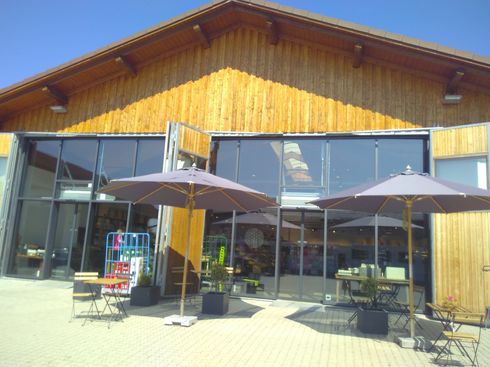
If you happen to take the S7 urban train in southern direction to the municipality of Höhenkirchen-Siegertsbrunn take the time to visit Roberts Bio-Genussmarkt on the premises of a former farmyard. The spacious, pleasantly refurbished and nicely decorated barn with its dark wooden shelfs makes it easy to spend some time on a coffee and cake in the included cafe area. When the weather is nice sun-shaded outdoor seating is provided. The former village of Höhenkirchen is part of the Mangfall bicycle route from Munich to Rosenheim, and this is a pleasant place for a break.
Waste-free supermarkets
By 2016 the first wrapping free supermarket made it into town: Check the zero-waste post for reviews.
Co-operatives with membership schemes
In the 1970ies and 1980ies many organic neighbourhood shops in Western Germany were co-operatively organised and sold to members only. In the 1990ies most of the surviving shops like the "Abakus" in Bremen opened to the general public, with discount schemes for members. To my knowledge, there's no such surviving shop in Munich, but recently established co-operatives such as "Deine Alternative" in Zorneding continue this inclusive approach.
As community supported agriculture (CSA) has an increasing appeal to city dwellers (the biggest one in Munich is the Kartoffelkombinat), the concept of an organic supermarket for members only came back to town in 2016, with
the Ökoesel ("eco donkey"), by now a small, yet full-fledged organic supermarket
in Nymphenburg near Leonrodplatz, focussing on
package-free food.
When the founders of Munich's oldest organic
supermarket, Lebascha in Haidhausen,
were to pass over the shop to a younger generation in summer 2022, the Ökoesel folks stepped in. Although both branches focus on a membership scheme, they are neighbourhood groceries open to everyone. As a non-member you'll simply pay non-subsidised (i.e. higher) prices.
In
summer 2021, another approach followed with the establishment of the Foodhub co-operative in Giesing, next to the lovely cafe "Shotgun Sister" and an organic bakery shop.
If you live in the vicinity you may consider joining this special organic food co-op which runs on the principle of solidarity: every member works three hours per month for or in the project and what's sold in the supermarket (predominantly regional produce) is decided democratically by its members. The shop concentrates on pre-packaged food, household and toiletry items, with the exception of loose weight fruits and veges, a small number of dry food gravity bins offering grains and nuts, and the self-service bread and rolls section. The household cleaning and bodycare shelves are filled with products in environmentally friendly packaging and focus on re-use (like the bamboo paper kitchen paper which can be washed and thus used several times) or little packaging through bigger volumes. There are plans for a zero-waste station to refill cleaning agents.
When I visited the shop at their open day in autumn 2021 I was surprised to not find a serviced fresh food counter given the fact that Karl Schweisfurt of Herrmannsdorfer Landwerkstätten is one of the three legal heads of the co-operative, most likely due to the fact that such a counter needs to be staffed.
No membership fee is required for becoming a member of the on-line market platform Marktschwärmer.
There's a
Marktschwärmerei pick-up hub in the neighbourhood of Milbertshofen. If you decide to join, you can order food, beverages, sweets and more from predominantly organic producers in and around Munich.
Formerly organic supermarkets
As part of the "teGut" chain the following, former "Basic" supermarkets still offer a reduced assortment of organic products:
- teGut Bogenhausen, Richard-Strauss-Str. 48, Mon–Sat 8–20 (as of summer 2024 still with organic butchers' and bakers' counter)
- teGut Neuhausen, Nymphenburger Str. 82, Mon–Sat 8–20
- teGut Laim, Agnes-Bernauer-Str. 73, Mon–Sat 8–20
- teGut Altstadt, Müllerstr. 45, Mon–Sat 7–20
- teGut Neuperlach, Thomas-Dehler-Str. 45, Mon–Sat 7–20
- teGut Ludwigsvorstadt, Luitpoldstr. 3, Mon–Sat 7–20
- teGut Schwabing, Belgradstr. 59, Mon–Sat 7–20
- teGut Victoriaviertel, Rheinstr. 1, Mon–Sat 8–20
Closed down
The following organic supermarkets do no longer exist although you will still find references to them on the web:
- Alnatura Innenstadt, Sonnenstr. 23
- Biochicco, Ohlmüllerstr. 19 corner Zeppelinstr.
- Biomarkt CM, Schlüsselbergstr. 13 (Berg am Laim)
- Denns w/in Hofstatt mall, Sendlinger Str. 12a, basement (city centre)
- Die Bio-Bäuerin, Peter-Wolfram-Str. 31 (Gronsdorf)
- Entenbach Naturkost,
Schlotthauerstr. 16
- Johannisgarten Naturkost, Johannisplatz 21 (Haidhausen)
- Gut zum Leben, Motorama Ladenstadt, Rosenheimer Str. 30-32 (Haidhausen)
- Tagwerk-Bioladen Hofgut Riem, Isarlandstr. 1 (Riem)
- Marktschwärmerei Werksviertel, c/o Cafe Guatemuc, Atelierstr. 1
- Nicos Naturkost, Kazmairstr. 38
- Veganz, Baldestr. 21 corner Auenstr., including self-service cafe Goodies
- Radix, Thalkirchner Str. 88 (Isarvorstadt)
- Vollcorner Ludwigsvorstadt, Lindwurmstr. 80
2024-05-02 14:00:00
[Munich, Au, Bogenhausen, Haidhausen, Harlaching, Lehel, Maxvorstadt, Nymphenburg, Schwabing, Pasing, Hoehenkirchen-Siegertsbrunn, Englischer_Garten, Mangfallradweg, Mangfall_cycle_route, organic, supermarkets, grocery, lunch, snacks, deli, Italian, CSA]
Link

Saturday, 13 April 2024
For an organic or at least partially organic lunch you have far more options than full-fledged restaurants or cafes with lunch options: There are a lot of eateries mainly catering for people working or studying nearby, shopping or travelling. You order your food and drinks at the counter, pay and find a place to sit down with your tray. However, if you come off the peak hours you will often be served, or the staff will offer to bring your coffee to your table after you finished your meal.
Just a few years ago this type of eating opportunity was almost exclusively offered by
owner-run organic groceries, usually taking the form of hearty vegetarian wholefood and sandwiches. Nowadays it's a much more volatile market
-- hip places come and go more frequent than in other categories.
Many of them have opening hours matching those of the cornershops – closed on Sundays, in the evening, and often also on Saturday afternoons.
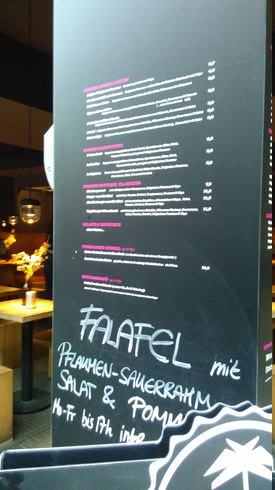
Near the university (Maxvorstadt)
The streets near the university buildings in Maxvorstadt are a natural place to look for places offering organic food, and they've seen a lot of shops popping up and closing down. Two long-established, though very different eateries are worth a try, both located in Amalienstraße: the Mutter Erde grocery offering vegan meals and the Pommesboutique grill. The latter was one of the first places in town to take no compromises with regard to meat, but it is following a more laissez-faire approach when it comes to the veges and condiments. So you have to ask about the origin of the latter if you care. All the sausages, burger patties, köfte and other (minced) meat come from an organic farm in the vicinity, and you can choose from a huge range of sauces. If you prefer your fries chewy – this is the place for you. Sometimes the tables are a bit too greasy for my liking, but with a little luck you come along when they have live music.
If you prefer your meat the Mexican way walk around the corner into Schellingstraße for Pureburrito, the second branch of a small climate-neutrally cooking local fast food chain serving burritos, tacos, and quesadillas. Unfortunately only pork and beef are organic, not the chicken, and you will find organic softdrinks of the Bionade brand in the fridge. There's another branch (much) farther up the street, near tube station Theresienstraße. All Pureburrito branches are closed on Sundays.
Build-your-own bowls and rolls with predominantly organic ingredients can be had at (and ordered from) Greens & Grains.
Even if the concept can become a little boring after a while it's an easy way to bring vegans, vegetarians and omnivores together for a quick and healthy lunch.
If you aren't very hungry it's a good idea to bring along a box to take leftovers home as the servings are huge.
The place is self-serviced and doesn't allow anonymous payments, only cards.
The second branch at Max-Weber-Platz does no longer exist.
City centre
To find organic food late on an evening out is a challenge in itself – night birds usually do not tend to be picky about the origin of calories at this hour. But if you enter the party zone Sonnenstraße (or spend an evening in one of the cinemas) the Bikini Mitte deli and bar comes to the rescue, conveniently located opposite a petrol station. During the day it's a decent, partially organic eatery offering bowls and sandwiches, usually made with organic veges, alongside organic soft drinks of the Proviant and Charitea brands. Bread and meat (apart from the occasional pulled pork) are not organic. Apart from Sunday the place keeps open until midnight, catering until the early hours Thursday through Sunday, and since the bar stocks locally produced organic gin, wodka and amaro (alongside a wide range of conventional spirits) your drinking can always be responsible.
The place may be known as "Bon Valeur" to locals as this is its former name (and the name of the company running it).
Just a few steps away, you'll also find the newest Pureburrito branch in the basement of the Stachus-Passagen mall.
The multi-cultural quarter in the vicinity of the central train station with its special mixture of electronic and immigrant shops should be the natural place to find organic food from the Levant, but only in 2020 a happy crowd of young Bavarian chefs with different roots opened Servus Habibi, a pita, hummus and falafel place cum (outside corona) bar serving organic meat and home-made pickles. Unfortunately none of the drinks are organic. Note that the place is closed on Wednesdays. If you are in the mood for falafel on this weekday try Beirut Beirut in Sendling.
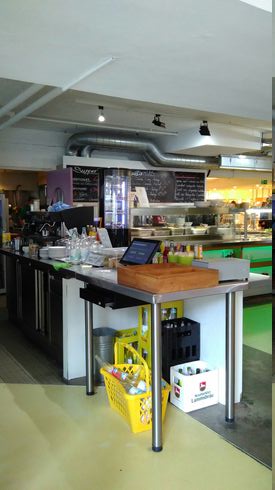 Another organic institution of old is Leo's Organic Kitchen near Isartor.
It started
as "Basic Bistro" in 2010, changed its name to "Byoo" when the organic supermarket on the first floor opened its own self-service eatery and changed it once again following its 10th anniversary, but the general the concept has not changed much since. So climb the stairs to this 100 percent organic place run by a friendly Vietnamese family, their extremely tasty, perfectly spiced (vegan) Saigon soup is worth it! Vegans, vegetarians and omnivores are all catered for with a happy fusion cuisine, often with an oriental touch. If you can't decide for one of the usually two soups and six main courses on the daily changing menu you can still pick from the antipasti and salads bar. A family-friendly place they will happily heap a helping of a side dish on your plate if you ask. They usually do not offer dessert, but you can have a freshly squeezed smoothie or an Italian-style coffee and cake, or simply a freshly brewed mint tea made from fresh herbs. Bring along your own jars if you you wish to take your food with you.
Another organic institution of old is Leo's Organic Kitchen near Isartor.
It started
as "Basic Bistro" in 2010, changed its name to "Byoo" when the organic supermarket on the first floor opened its own self-service eatery and changed it once again following its 10th anniversary, but the general the concept has not changed much since. So climb the stairs to this 100 percent organic place run by a friendly Vietnamese family, their extremely tasty, perfectly spiced (vegan) Saigon soup is worth it! Vegans, vegetarians and omnivores are all catered for with a happy fusion cuisine, often with an oriental touch. If you can't decide for one of the usually two soups and six main courses on the daily changing menu you can still pick from the antipasti and salads bar. A family-friendly place they will happily heap a helping of a side dish on your plate if you ask. They usually do not offer dessert, but you can have a freshly squeezed smoothie or an Italian-style coffee and cake, or simply a freshly brewed mint tea made from fresh herbs. Bring along your own jars if you you wish to take your food with you.
When taking a stroll through the Viktualienmarkt market gourmet restaurants like the Tian aren't your only lunch option: A few steps away (opposite Schrannenhalle) you'll find Yum 2 Take, an (evening open)
Thai eatery and take-away serving organic meat.
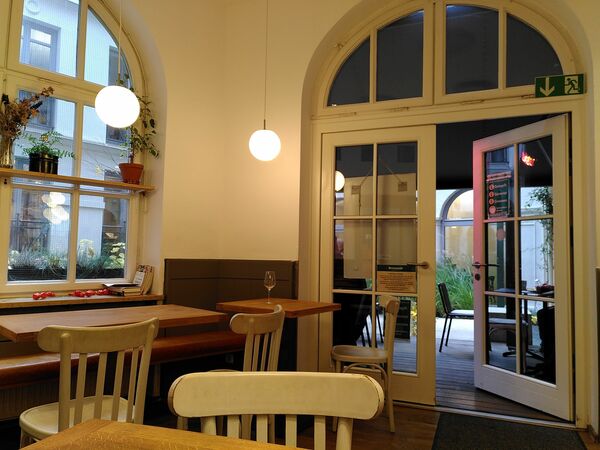
Hearty, fully organic German lunch is being served at the Bistro ÖQ in the back of the Virtualienmarkt branch of the Herrmannsdorfer Landwerkstätten organic butcher's. Usually you will be waited but better keep your eyes open whether it seems more appropriate to order directly from the open kitchen and at the end go and pay there. Naturally this is a place for omnivores and meat-lovers but there's always a tasty vegetarian dish available. The kitchen draws both, from German and Italian countryside kitchen traditions, serving mouth-watering risotti and pasta dishes as well as a piece of meat or fish with side-dishes, following seasonal availability and properly prepared. For the real Munich experience do not miss their potato salad (not suitable for strict vegetarians, though)!
Carnivores and beer-lovers are also catered for a few steps away, in the mumble-jumble of Viktualienmarkt: The market stall of Kleiner Ochs'nbrater ("little ox grill") serves Munich fast food specialities, which naturally means beer and meat. Have a Leberkäs (meat loaf), sausage or pork roast (Schweinebraten) – (except for the beef and some side dishes) it's all organic, locally sourced and tasty – as are the Brezn (pretzel) and the drinks (beer, wine, softdrinks). It can be difficult to find a place to sit down, so watch out before you order a dish on a plate. Even though the Viktualienmarkt is a tourist hot spot, it's one where tourists and locals mingle (opposed to e.g. the legendary Hofbräuhaus).
On nice weather days the grill may keep open a little longer than 6 pm. Note that it is closed both, on Mondays and Sundays.
The time of the vegan hotdog shop
Organic Garden behind Heiliggeist church is gone,
but the former chef of the male German football national team is now running the refectory of the Bavarian state ministry of agriculture, forestry and tourism the which is open to the public for lunch.
If you prefer low-processed plant-based food head for the Glockenbachviertel. Here
Noams Deli offers filling bowls and hearty one-pot wonders as stews or curries
predominantly (if not only) made with organic ingredients. Bring a jar if your appetite isn't huge, to take the remainders with you, as the clean-eating inspired dishes often are more filling than anticipated. On nice weather days the outdoor tables allow for people-watching while having a coffee drink and perhaps a banana bread, brownie, or raw sweet. The shop with its stylish, polished wooden interior isn't open in the evening, but on the other hand its focus on healthy
food may be too much for the night.
There's a second Noams branch in the university town of Gießen.
Near Ostbahnhof station
On the East side of the railway tracks, inside the developing Werksviertel party, start-up, and cultural area there's a Pureburrito branch serving Mexican style street food with organic pork and beef (see here). Unfortunately party-goers will be disappointed since it stops serving food by 9 pm.
Haidhausen with its majority vote for the Green Party has several organic hotspots, and one of them is Elsässer Straße East of Bordeauxplatz. A few steps from Haidhauser Oase, next to an organic bakery and opposite the organic neighbourhood grocery Lebascha you'll find Erbil's, the only vegan doner kebap shop in town. Instead of meat you'll get organic seitan, and some (but not all) of the vegetables also are organic. Choose an organic softdrink or beer from the fridge, but have an eye on organic labels since not everything is organic. They also serve organic tea and tisanes and use organic oat drink for coffee drinks. Unfortunately they do not sell baklava for dessert during covid-19 restrictions, instead you can choose from a number of home-made cakes for take away.
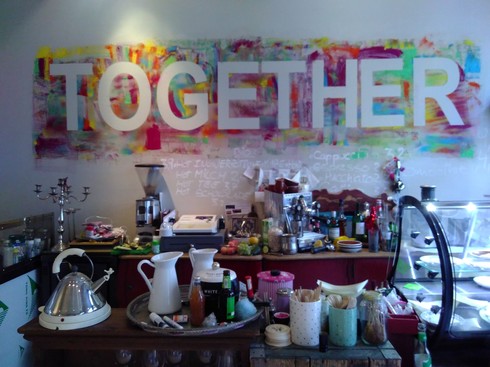
More vegan lunch in the form of Israelian-style vegan mezze can be had just a few steps away at Oliver offering an all-you-can-eat lunch buffet at the very competitive price of 10 EUR. The friendly owner assured me that all of the ingredients except herbs and spices were organic. You can also borrow a blanket and picnic basket and take your lunch to the park at Bordeauxplatz. Lunch time stops when everything is sold, and you may of course use your own jars and boxes for take-away. In the afternoon and evenings step by for
hand-rolled vegan ice-cream, freshly prepared while you wait: A plant-drink based "batter" is poured onto a freezer plate, stirred with fruit, berries, home-made cookies, nuts and other flavourings you specify, frozen to a thin sheet of ice-cream, rolled up and served in a bowl.
When the weather is nice and warm the shop keeps open until 10 pm on weekdays except on Mondays when it is closed.
If you proceed in direction Max-Weber-/Wiener Platz (coming from Rosenheimer Platz or Ostbahnhof you may take the tram) to the tram stop Wörthstraße (and can resist beautiful, fully organic Cafe Reichshof on your way) you'll reach Würzbar. The name of this pleasant ayurvedic vegetarian eatery, cafe and spice shop is a pun derived from the verb "würzen" (to spice up) and "bar" (as bar) and the homonymous suffix "-bar" meaning "to be capable of something". The food is all organic (as are the drinks), but not all of the products for sale are certified.
As of July 2022, there's unfortunately no gastro service, but let's hope the eatery will be back soon.
On busy Rosenheimer Straße, a few steps from the Ohne zero-waste shop the
Heartbeet salad bar serves salads and bowls. All
veges, the ice-cream and some (non-alcoholic) drinks are organic,
and at an extra price you can get organic eggs on top of your bowl. It's a heaven for clean-eating lovers, but if you love spices this isn't a place for you. The concept had been a success story during corona delivery and take-away, leading to the opening of branches in Neuhausen and w/in the Feinkost Käfer deli near Münchner Freiheit, but they had to close again. Insist to get your food in deposit dishes if not bringing your own boxes. If you cannot fetch you order by bicycle yourself their delivery service will pedal it to you.
Located directly at Weißenburger Platz Spoon Up offers hearty soups and stews for lunch and promises to use regional, often organic produce. Unfortunately the only organic ingredient visible on the daily menu is meat which is marked as 'bio'.
Bogenhausen and Englischer Garten
There's a second Herrmannsdorfer Bistro ÖQ near Effner-Platz (also see here).
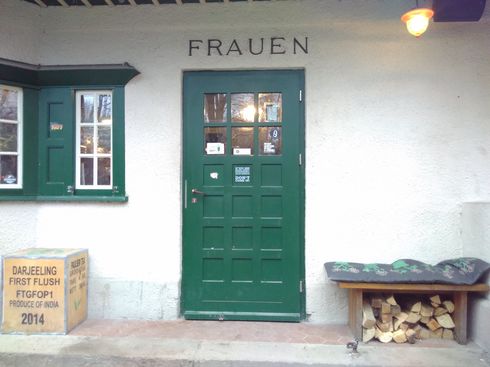
On the opposite shore of the river Isar, on the Eisbach not far from the famous surf wave near Haus der Kunst you'll find a former public convenience turned into a tiny cafe: Fräulein Grüneis offers no more than a handful indoor seats, during the cold season heated by a small wood oven, but as long as the weather allows for it you may prefer to have your lunch or coffee outside anyway, under the trees of the Englischer Garten park.
For lunch you can have a soup, one-pot dish or curry, vegetarian or omnivore.
The meat is always organic as is the beer, for soft drinks stick to the charitea brand. Apart from this the owners promise to use as much local and organic produce as possible, but if you want to be certain you have to ask. Avoid the ice-cream, the (small-scale local) Eizbach lemonade and the sweets by the piece, all of them without doubt conventionally produced.
Schwabing
The Yum 2 take Thai restaurant has a second branch on Hohenzollernplatz.
Ludwigsvorstadt and Sendling
A few meters from tube station Goetheplatz you'll find the mother branch of the Pureburrito chain.
Tube stop Implerstraße is the right direction for the best (and partially organic) falafel in town: The Beirut Beirut is not only a great place for take away, but also offers sufficient seating inside since they moved away from their old shop in Valleystr. While the Lebanese wine unfortunately isn't organic there's a choice of organic spritzers ("Schorle") from local producers. For more Lebanese food you may also pay a visit to their sister restaurant Manouche, now a few street corners away offering Levantine "pizza", coffee, sweets and other delicious snacks.
The Neulinger bakery also runs self-services lunch cafes on their two locations near the Großmarkthalle (Munich's biggest market hall offering fruits and veges for retail) and in the meat packing district.
Hadern
A short walk from tube stop Großhadern you'll find a Vollcorner supermarket with a work day open, 100 percent organic breakfast and lunch restaurant, before the covid-19 pandemic known as Cucina, now dubbed Vollcorner Deli. Here you can choose between soups, stews, salads, bowls and sandwiches and of course have a coffee drink with a piece of cake.
Westend
The Vollcorner supermarket on Schwanthalerhöhe (next to Theresienwiese and hence good to know if you attend the annual Oktoberfest beerfest) has a deli cum cafe which invites for a small meal or snack.
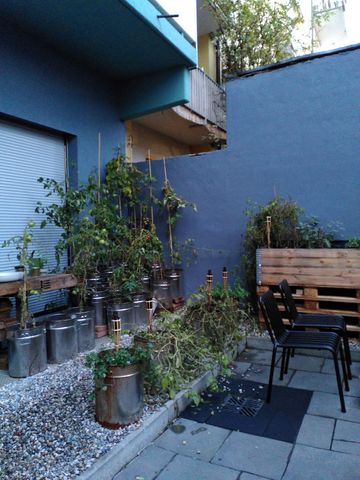
For a more elaborated breakfast or lunch follow Schwanthalerstraße into the Westend neighbourhood and stop by Das Kulinariat. Whether you'll opt for a vegetarian course, a traditional Bavarian organic Weißwurst breakfast or their speciality – Eggs Benedict – chances are high that some of the greens on your plate have been grown right in the surprisingly spacious backyard. Additional veges come from a local organic farmer, and almost everything is organic here in this culinary gem with its light and modern, predominantly wooden interior.
Pasing
A second Vollcorner Deli opened 5th September, 2019 in the former "Erdgarten" organic supermarket near Pasinger Marktplatz.
Shut down
The following (partially) organic eateries are closed for good:
- Basic Biobuffet, Herzogstr. 129
- Buxs, Frauenstr. 9 (city centre)
- Greens & Grains, Max-Weber-Pl. 11
- Greeny's, Tal 42 near Isartor (city centre)
- Soupmama, Frauenstr. 2 opposite Viktualienmarkt (city centre)
near Viktualienmarkt (city centre)
- Brotzeit bei Herrmannsdorfer, Holzstr. 24 (Glockenbachviertel)
- Annapurna (former Ganesh), Wörthstr. 7 (Haidhausen)
- Grilly's, Rosenheimer Str. 117 (Haidhausen)
- Iss dich glücklich, Preysingstr. 42 (replaced by the Sorry Johnny coffee bar)
- Heartbeet, Nymphenburger Str. 84
- Heartbeet w/in Feinkost Käfer, Leopoldstr. 57
- Lecker-Bissen, Theresienstr. 27 (Maxvorstadt)
- Little Habibi, Fraunhoferstr. 32
- Organic Garden Signature Store, Heiliggeiststr. 1
- Organic Garden Eatery inside Mercedes Benz Studio Odeonsplatz, Brienner Str. 1
- So Ham inside Jivamukti Yoga studio, Buttermelcherstr. 11–15
- Sweekies, Wendl-Dietrich-Str.4 near Rotkreuzplatz (Neuhausen)
- Bio-Brüder, Ottostr. 67 (Ottobrunn)
2024-04-13 20:00:00
[Munich, Giessen, organic, bar, eatery, breakfast, lunch, coffee, clean, vegan, vegetarian, Bavarian, German, Lebanese, Mexican, Thai, Vietnamese, grill, burgers, doner_kebap, falafel, streetfood, Maxvorstadt, Haidhausen, Hadern, Neuhausen, Pasing, Schwabing, Sendling, Werksviertel, Westend, Eisbach, Englischer_Garten]
Link

Saturday, 06 April 2024
To find a place for an organic lunch, snack or a coffee break, both served and self-served, requires not more than keeping your eyes open. But the cultured evening out or a sumptuous weekend brunch can be a challenge if you don't know where to head for.
If you opt for 100 percent organic food and drinks, without compromises, within the city boundaries the TL;DR is La Trattoria and Josef.
French
Given the French love for quality food one would expect all self-respecting French restaurants to use organic ingredients to a certain extent, but to actually find those which do proves to be harder than expected. In Munich head for brasserie La Bouche in Schwabing, a tastefully decorated place a few steps away from Münchner Freiheit. They promise to use organic ingredients throughout the menu, with three quite excusable exceptions: snails, seafood and Marsala wine.
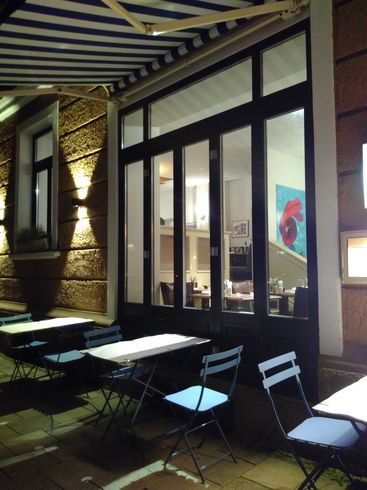
In fact the exception list varies depending on daily supplies – when I went there the lamb and the duck liver had been added – but since it is all transparent and clearly stated on the menu you can adapt you order accordingly. The food itself is hearty French countryside fare, apart from the risottos (together with the Italian coffee the international touch to the menu) most dishes focus on meat or seafood. Since the main courses are very generous compared to other French restaurants, come hungry or skip the starter. In the meat-based stews we had – coq au vin and an ox liver ragout – the flavours of the ingredients were perfectly amalgamated and harmonic. The entrecote marinated in a pesto of fresh herbs – although perfectly cooked rare – however, did not live up to expectations, too perfumed, too imbalanced (and way too big) for my taste. Although the side dishes – salads, stewed root vegetables, fried potatoes, and similar – clearly play a supporting role they were well done and tasty. And the baguette served together with the starters was clearly one of the best I ever had.
Sadly the wines aren't organic, the soft drinks however are, and the bar offers organic pastis, gin and vodka. Note that the place is closed on Sundays.
German/Bavarian
With its rustic and cosy flair and garden tables under horse chestnut trees during the warm season Zum Kloster in the heart of the former village of Haidhausen a short walk from Wiener Platz makes the perfect surrounding for a laid-back chat with friends. They serve a selection of organic non-alcoholic beverages and up to three dishes on their meat-centric hand-written menu are marked with a star as made with organic meat, eggs and flour, one of them being Spaghetti Bolognese. The dishes are simple, but perfectly eatable home-made fare. Only the salad should better not have been as soaked in rapeseed oil as it was.
For take away come with your own container to avoid extra waste. (The covid-19 delivery service was discontinued.)
If heading for the classical Bavarian Wirtshaus – rustic, but perhaps missing the air of the students' and artists' pub present in "Zum Kloster" – the Klinglwirt at the opposite end of Haidhausen near Rosenheimer Platz is the place to go. They serve organic meat from the nearby farm in Herrmannsdorf, organic cheese, bread, coffee, tea as well as Del Fiore ice-cream. Even the side-dishes – mainly potatoes, dumplings, sauerkraut, red cabbage and rustic salads – are now often organic, and vegetarian and vegan dishes have become a permanent part of the menu in their own right. The drinks menu offers at minimum one organic option for most beverages. Little guests are welcomed warmly, among others with a decent menu of their own (most kids will accept happily that the dishes listed there are almost free of greens). The restaurant is a member of Green Chefs, a network of eco conscious and socially responsible chefs.
While the Munich population has strong, yet mixed
feelings about the Oktoberfest, the strong beer festival during lent
is probably meeting much less negative sentiment among locals.
In fact, the political cabaret ("Derblecken") at the opening of the festival,
is a major event in local politics.
Although the host brewery, Paulaner, does not brew organic beer, the very
place of the festival, the
Nockherberg restaurant in the Au, offers parts
of its menu in organic quality: All organic items are marked green, or (as for the beverages) with the organic label.
They use organic flour and milk, the tofu is both, Bavarian and organic, and a selection of traditional meat dishes like the "Böfflamot" (the Munich version of
"boeuf a la mode") are made with organic meat.
Mind you that there is a decent selection of organic wines and non-alcoholic beverages, but no organic beer.
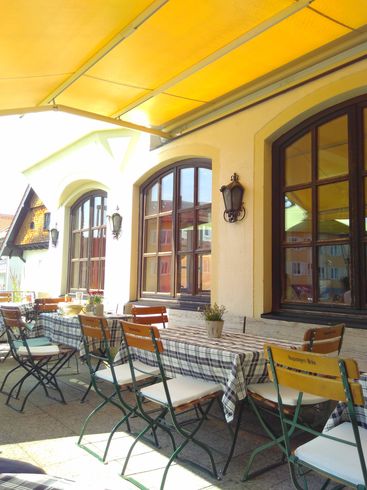
For the 100% organic experience of Bavarian cuisine take the tram no. 25 from Rosenheimer Platz to its final destination in the suburb of Grünwald. A five-to-ten minutes walk from there you'll find the only organic hotel in reach, Alter Wirt, with its rustic, yet up-market restaurant. Children are welcome and often even allowed a visit to the kitchen, but the place is spacious enough that occasional little guests won't spoil your romantic candle-light dinner. There's a beergarden under horse chestnut trees, and the entire place is a real oasis in suburbia. The menu focuses on the meat- and fish-centric Bavarian Sunday kitchen completed with dishes of Italian origin. The food is extremely tasty, home-made, yet peppered with pleasant little twitches of ambitious chefs. Not the natural place for vegetarians, but if you happen to be the only vegetarian in a group of omnivores, there's a tasty meal for you as well. In addition they offer a range of assorted organic spirits.
Early risers may also step by for breakfast.
If you prefer a sandwich and coffee on the go turn to the co-located artisanal Brotzeit bakery.
Fancy a day out in the Bavarian countryside? So why not paying a visit to the Herrmannsdorfer farm about 30 kilometres from Munich? Their up-market 100 percent organic restaurant, the Wirtshaus zum Schweinsbräu, rewards with the finest of Bavarian food traditions.
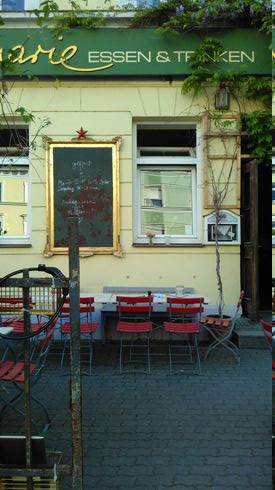
At tube stop Poccistraße in Sendling, just across the street from the Vollcorner branch in Lindwurmstr. 80 the Goldmarie restaurant serves classical and modern versions of seasonal Bavarian, Austrian and North-Italian dishes – quite palatable, but also a little boring. It's very obvious that the quality of the ingredients makes the difference here rather than the skills or visions of a chef: Usually the meat is organic and – in this case – marked "bio" on the menu. The veges are often organic, too, though not marked. Not organically certified meat and greens come from small-scale conventional farms in the region. Unfortunately the drinks (except for the gin and the herb tonic water) aren't organic. The place itself is often quite crowded.
They advertised "Highclass organic food" in the 2015 print issue of Spy city guide, and you will find them listed as organic on the web, too, but when I rang them up a few years ago the staff ensured me repeatedly: No, we do not use organic ingredients. Since they themselves do not mention the word "bio" on their German website it's likely that lack of command of the English language lead to this misconception. But one must never say "no" – the menu as of April 2024 advertises organic bread (with vegan spread) by Munich's it-bakery Julius Brantner, and with Munich's gastronomy and club icon Sandra Foster of the Blitz restaurant behind it the Roecklplatz restaurant is definitely worth a visit: It is a socially responsible enterprise employing young apprentices in difficult life situations and/or without formal education which in itself deserves support.
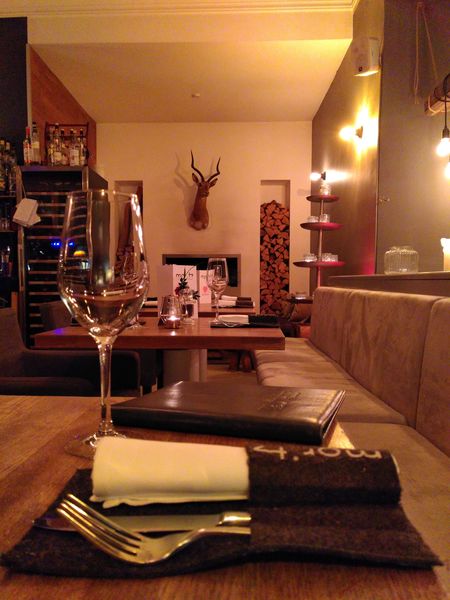
International
Not a single word on their menu suggests that Miss Lilly's kitchen in Giesing prefers organic ingredients. But when tasting their huge and extremely yummy home-made burgers or Wiener Schnitzel it's perfectly reasonable that not only the meat (as confirmed by the staff) but also a good deal of the side-dishes are at least partially organic. Although vegetarians are catered for it's very obvious that Miss Lilly's chef prefers meat and does it perfectly. If you come with kids and ask for fries they will be served huge portions – so don't order too many.
The place near tube stop Kolumbusplatz serves breakfast until 5 pm and is famous for their home-made American cheesecake – I had the peanut butter variety which was very palatable, but to my taste not as exceptional as I had heard, together with a proper Italian-style coffee.
Tuesday to Saturday evening it turns into Moritz bar and restaurant, with a likewise tempting menu specializing in the South-German and alpine cuisines. If you are after an organic alcoholic drink you have to stick to The Duke gins – the wine and gin menu unfortunately does not leave you with much choice.
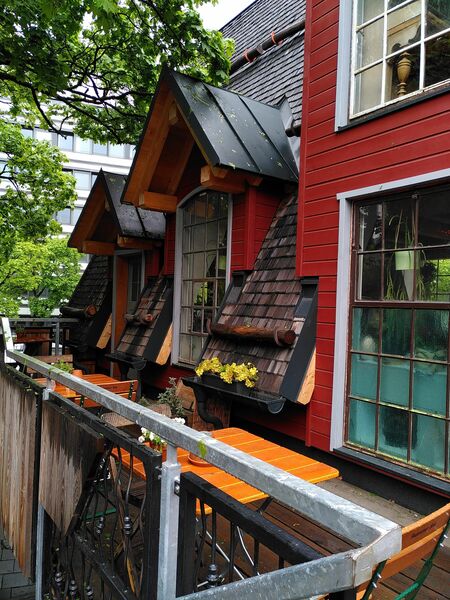
A wooden witch cottage, with several hideaways, balconies, verandahs to almost get lost in, indoors and outdoors, an open cultural stage, magical sourroundings (almost) under a train bridge – no, the appearances of the bar
Gans Woanders near Kolumbusplatz are deceptive: This is not an
ancient building, but a brand-new construction opened in 2020. Although the quantity of organic ingredients used in the menu dominated by pizza and cake does not entirely live up to the sustainability promise of the place, you'll find at least organic
coffee, tea and lemonades, and I was assured that the potatoes always were organic. Note that the place is self-services and accepts
cash only.
In the South-Eastern part of Giesing, near congested Tegernseer Landstraße yet tucked away in a pleasant neighbourhood at Alpenplatz you will find another rustic place, Das Edelweiß. Since it started as an organic restaurant about six years ago you will still find business cards and references describing it as organic, and you can still order organic softdrinks. Unfortunately the concept did not work out, and the focus has shifted from organic towards supporting local and small-scale businesses. Some of the ingredients such as the milk of the Sternenfair brand are produced according to near-organic principles, the tasty artisanal bread may sometimes be made from organic flour, if you come for breakfast on weekends you can have organic chocolate spread, maple syrup and hot chocolate, but you should rather expect artisanal conventional food. When I questioned the owner about it she assured me that she's trying to find a new chef with love for local and seasonal high-quality food, and hopefully a renewed focus on organic principles will follow.
A dedicated family restaurant in the queer and hip neighbourhood of Glockenbachviertel dubbed Kaiser Otto is the place in Munich closest to the cafe latte moms cliche. You may step by for a coffee break during the day, or have breakfast, brunch, lunch, and dinner while your kids may disappear to a dedicated playground room next to the cafe. The latter is however closing at 7 pm. Weekend brunch with child care has been discontinued during covid-19. The food is not very elaborate, but often made from at least partially organic ingredients. Reliably organic items on the menu are coffee, eggs, bread, a selection of soft drinks as well as the meat served with one of the dishes to have for dinner. Greens, veges and pulses may or may not be organic, so you have to enquire, meat items served until 3 pm are definitely not.
The contrary of a family restaurant, i.e. a decent (American-style) bar cum burger restaurant is
The Potting Shed near Münchner Freiheit, a few steps from Brasserie La Bouce. Instead of french fries you're served yummy rosemary-flavoured potatoes, instead of prefab mayonnaise delicate home-made aioli, and the coleslaw was crisp, showing off the (organic) quality of the cabbage. The top of my burger bun was caramelised, adding an interesting twist to the taste, and the patty, announced as medium, still gorgeously pink. Unfortunately they do not do rare burgers which indicates that the meat is minced in advance. All meat products come from a organic-only local butchery, and the delicacy of the food indicates that most of the vegetarian ingredients are organic, too. For those not feeling like having a sumptuous high-calory burger plate (there's one veggie option) there was a tasty seasonal salad (with goat cheese) and a range of tapas, mezze and small starters, decidedly omnivore. Unfortunately the rich bar sports only a few organic drinks, namely an organic Cabernet Sauvignon, The Duke and Lyonel gins (the latter made a nicely balanced jasmin-tea flavoured gin and tonic) and fairly traded cachaça. Soft drinks including the tonic water however aren't organic at all. The bar itself values traditional bar etiquette: an observant yet not obstrusive waiter (who took care of our jackets when we came in), a skilful professional barman, pleasant background music at a volume allowing for effordless conversation (though I cannot say anything about the noise on a Friday or Saturday night), the walls adorned with interesting and tasteful art. Definitely recommended for a civilised evening out.
Italian
Mix the interior of a trattoria in Italy with a Bavarian Wirtshaus, and you'll end up with
Hostaria Rò e Buni, a certified organic Italian restaurant in the heart of Schwabing. The name alludes to the dialect words used in the area of Bologna to steer bullocks to the left and to the right, and the tasty food served here has its roots in the country kitchen of the Emilia Romagna - not too fancy, hearty, receiving its fulfilling taste from high quality organic ingredients, many of them (especially the meat) sourced from farms in the greater region.
Unlike in many other certified restaurants almost all ingredients are organic indeed, those coming from conventional agriculture are clearly marked with a star on the menu. Vegetarian and vegan drinks and dishes can be easily distinguished by a leaf or flower label, respectively. Although the owner has Italian roots don't order a four course menu (antipasti, pasta, primo e secondo) a la carte unless extremely hungry – the sizes of the dishes are adapted to the German habit of ordering a pasta or main course and perhaps a starter. If you feel Italian stick to the four course tasting menu suggested by the menu, or discuss with the affable publican. Don't leave without having tried their fresh home-made pasta, and an organic grappa to finish. If you fancy slow-cooked Italian meat classics like Osso Buco – here's the place to try.
The kitchen closes half an hour before closing time, and the place itself keeps open evenings only.
If you do not want to compromise at all when it comes to organic food and drinks find your way to Sendling: Former Bavarian-Italian restaurant "resihuber" went fully Italian and consequently changed its name to La Trattoria early in 2020. The place is run and backed by the founders of the local Vollcorner supermarket chain and can easily be reached by tube (stop Brudermühlstraße). Unfortunately they do no longer serve breakfast, instead you may order pizza home or (at a small discount) to take away.
The place is also a
convenient choice before or after a concert at (or other visit to) the Gasteig HP8 concert hall and cultural centre, with truly Italian food and predominantly regional ingredients catering for all: vegans, vegetarians and meat lovers. After a concert or stroll at the Isar shore you may also step by for a high quality, fully organic drink, both with or without alcohol.
The place survived the covid-19 pandemics as a pizzeria, and staff shortage in 2024 turned it into a half-serviced restaurant, a concept known from smaller cafes and eateries: Have a seat, memorise the number of your table and place your order at the bar. Food and drinks will be brought to your table.
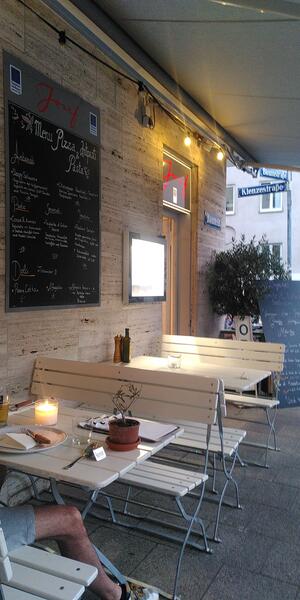
In 2023 the Trattoria got a sister restaurant, the
Osteria Biologica Josef which, located in the
Glockenbachviertel, is much
better accessible from the inner city. During the summer everyone would sit outside in the so-called "Schanigarten", on white garden furniture in lieu of parking lots along the street. The Italian street feeling is matched by excellent food and drinks. An exciting selection of aperitivi and a relatively short menu offering pizza, salads, pasta, and few main courses ensure absolute freshness and tastiness. Most dishes are vegetarian or meat-based (all of them have full meal size), but there are also a few (fully qualified) vegan options – given the shortness of the menu these make up for a higher relative percentage than you may realise at first. As everything is organic, prices are rather up-market, but a delicious pizza with a gorgeous crust (at around 15 EUR) is sufficient for a very satisfying evening. The staff is cheery and helpful. During the colder season there will be brunch, too. Ring in to order a table during opening hours, especially on weekends I strongly recommend this as the online booking system seems to not cover all available tables.
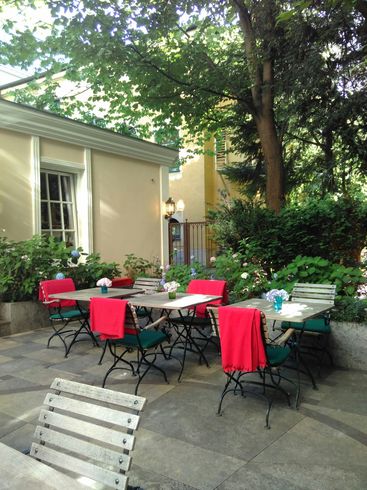
A hidden gem in very upmarket locations, quietly located in a backyard of Maximilianstraße next to the Kammerspiele theater
is Max Trenta, a small Italian restaurant with an open kitchen where organic ingredients, often from small-scale farms, are frequently used, though neither promised nor advertised on the menu. Some of the courses are Italian dishes well-known outside Italy but since the friendly owner values the kitchen of his childhood his guests are so fortunate to taste Sardinian specialities like the fregula pasta type and the typical pane guttiau crisp bread which is served as an appetizer. Unfortunately these crackers tasted very bland, not comparable with the organic ones readily available in Munich's organic groceries. The extremely tasty and characterful natural open wines come from a Sardinian winery co-driven by one of the owner's relatives but aren't organically certified. In the summer you can sit outside where there's a little space for kids. Note that the kitchen closes already at 9pm.
Mediterranean/Oriental
No bosses and driven by consensus: Its unusual organization qualifies the Neuhausen based restaurant cooperative Ruffini for a recommendation on its own. Their Italian and Mediterranean food looks and tastes like mother's – it is prepared with love though without the ambitions of a trained restaurant chef. Although they cater for vegetarians and omnivores alike only meat and eggs are organic. Which is sad – the Imam Bayildi I had tasted bland as the eggplants did not have the concentrated flavour of organic ones. On the contrary their home-made croissants – organic or not – are without doubt worth a sin: You'll have to travel far to find equally full-flavoured ones, so take away (or come to shop at their bakery a few meters away). Have an organic ice-cream for dessert – during the warm season it's also offered to take away.
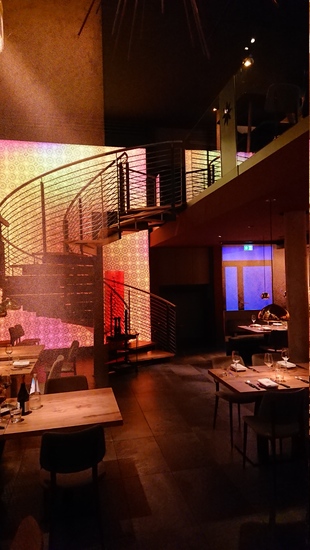
If you love the cooking books by Sam&Sam Clark of the London-based restaurant Moro (which I unfortunately have not had the opportunity to visit) or simply are in the mood for refined yet down-to-earth oriental mediterranean food head for The Spice Bazaar tucked away in a big void between the ticket office of the Bayrische Staatsoper opera house, the Spanish Instituto Cervantes and the Hofgarten garden. In the evening you often won't find a soul on the place before the restaurant, but when you enter a breathtakingly decorated space prided with gold and ornaments is welcoming you – not the bling-bling of an oriental bazaar, but its Bauhaus-inspired interpretation on two floors, the upper one an almost intimate but open gallery. All the meat is certified organic, and you can pick organic wines and soft drinks on the menu, but although many other ingredients most certainly are organic there's no promise to it. The menu and the staff encourage you to share your food with those you came along – in this case all dishes will be placed in the middle of the table and an empty plate will be put in front of each of you. Be warned: the servings here are generous and deliciously spiced so that it's easy to eat far too much. A main course – meat, seafood or vegetarian – with a side dish will satisfy a hungry eater, so rather order less and share, especially if you also opt for one of the tempting first courses. At my first visit we made the mistake of ordering too much (delicately spiced caramellised nuts and bread with gorgeous olive oil as starters for our hungry crowd) so that I cannot say anything about the desserts yet. Prices are upmarket, but if you take into consideration the quality and the quantity they are more than fair.
Opposite the "Osteria
Josef" in the Glockenbachviertel you'll
find Mary – or rather
Das Maria. In fact the restaurant should be called "Maryam" as it specialises in mezze and food (and coffee) from the Maghrib and the Levante. Moreover it has been a famed breakfast spot for many years, serving oriental and orientally inspired occidental breakfast varieties throughout the day, on oriental dishes. The majority of ingredients, staples and drinks are organic and marked as such on the menu, either with an asterisk or with the "bio" keyword.
The place is quite small, so despite its very reliable opening hours and especially during the cold season when outdoor seating isn't an option pre-booking is advisable. Families with babies and toddlers should find a different spot for a family meal as there are no changing facilities, and both, changing and prams are not welcome inside the restaurant.
Japanese/Sushi
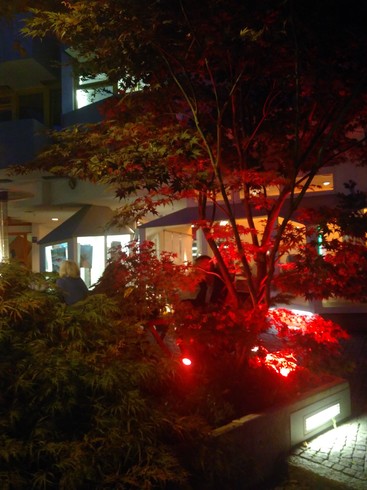
With the explosion of sushi take-aways you may have to kiss many frogs on the quest for sushi worth its name. Arguably one of the best sushi restaurants in Munich is the Sushiya Sansaro in the Amalienpassage backyard passage in Maxvorstadt, a three minutes walk from the Northern exit of the Universität tube stop. As you might expect from a restaurant with love for – in this case – Japanese – food they use some organic ingredients (eggs, spinach and pork for example), the soy sauce is organic and you can order organic beer, juice and some wine with your meal. The menu does not stop with sushi, instead you can get a good impression of the Japanese kitchen, both in its vegetarian and its meat-based variety. The place itself is pleasant but often crowded. If you cannot get a reservation do not dispair: You can also order by phone or online and step by to take away, or even better: Bring your own (bento) box, and wait while your sushi is being prepared.
Lebanese
See here.
Mexican
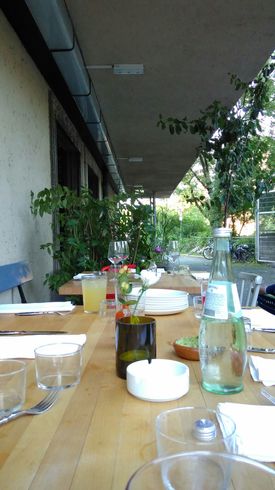
The latest enterprise of prominent Munich publican, club manager and cooking book author Sandra Forster, herself a vegan, is the Blitz ("lightning") club located within the entrance building to the Museumsinsel island housing Deutsches Museum, the congress hall finished in 1935, formerly used as a cinema. Attached to the club is a Mexican-vegetarian restaurant, with dancing skeletons in colourful costumes adorning the walls. During the warm season enjoy a sugar cane cocktail and yummy fajitas or quesadillas, on a peaceful terrace outside facing the river Isar. About 80 percent of all ingredients used in the kitchen are organic and – if possible – sourced from farms in the greater Munich area. Exotic ingredients difficult to find in organic quality usually make an exception. If you want to avoid eggs and dairy products (which come from animal-friendly farms) do not hesitate to request a vegan meal.
Vegan/Vegetarian
My favourite vegan place, the Gratitude in the humming University quarter of Maxvorstadt, once was fully organic except for alcoholic beverages. While in the beginning the food was simple – raw or inspired by ayurveda – and sometimes a little bland, the kitchen improved vastly over time, reaching the level of Munich's legendary first (though no longer existing) vegan restaurant Zerwirk. Around 2020 the place got into financial troubles, closed for refurbishment, and covid-19 did its job. Now it's back again, as The Gratitude Eatery, with international vegetable dishes, from Nigiri and Tempura to risotto and curries, using sometimes less, sometimes more organic ingredients. You can have organic beer, and there's also an organic white wine on the menu, but I love the place for its fairly priced and not too sweet cocktails (which unfortunately aren't organic).
Between Viktualienmarkt and Gärtnerplatz (i.e. no longer next to Isartor) you'll find
Siggis vegan and fresh food, a 100% vegan place that from the outside looks like a coffee bar. In fact you can step by for a (cup) cake, vegan latte, organic coffee (in a recup.com retour cup if you're in a hurry) or partially organic sandwich but you may also stay and have lunch or dinner served. The kitchen uses a good deal organic ingredients for the quite casual menu offering pasta, sandwiches, bowls, and a few international main dishes. Most drinks are organic, though if you have a latte and specify your favourite vegan milk alternative be aware that the lupin milk isn't. Ask if unsure whether any of the ingredients are organic – the stuff is helpful and willing to enquire in the kitchen if they don't know.
Note that the place is closed on Mondays.
An older vegan restaurant is the Max Pett near Sendlinger Tor, run by a former Zerwirk chef. Unfortunately it's only partially organic, which is probably why the kitchen does not live up to expectations. The place is 100 percent non-alcoholic.
My favourite vegetarian, vegan-friendly restaurant is the Blitz described above.
Vietnamese/Asian Fusion
Crisp and delicately spiced instead of greasy and cooked to death, this is how the Fei Scho eatery serves Vietnamese food with a Bavarian touch ("Fei scho" is a Bavarian dialect phrase indicating that the counterpart in a conversation should have known/done/recognised something already). The menu of the small place in the Glockenbach neighbourhood consists of a handful of rice and noodle dishes, as well as Vietnamese veg parcels. A few ingredients (namely eggs, chickpeas, and, during the summer, carrots, red cabbage, coriander as well as celery) are organic (unfortunately neither the meat nor the tofu), along with all the wines, the iced tea, the apple juice and the gin and tonic. For a while there was a second restaurant in Haidhausen with slow and forgetful service, but that's past.
More to try
Of the following places I found testimonies and other evidence for use of organic ingredients, but I have not been able to verify them by a personal visit. If you get there let me know whether they should be listed here, and I'll do my best to eat there, too.
Greenwashed
An increasing number of Munich street festivals demands an organic certification of their food stalls: The Tollwood festival has been serving organic food only for many years while stalls at funfairs like the Oktoberfest and or the Auer Dult are required to offer at minimum one certified organic serving. Unfortunately some of the contractors comply only as long as they are forced to and do not even use a minimum selection of organic ingredients in their restaurants – a behaviour that potential guests of the following places should be aware of.
About ten years ago this blog featured the Ratskeller townhall restaurant at
Marienplatz which back then had a separate organic menu. The only sad reminiscence of this past are a handful organic beverages: beer, juices and softdrinks. If you happen to choose this place for its gorgeous location inside the townhall ask the waiter: If you are lucky some organic ingredients will be deeply hidden in the menu of the day.
Ceased to exist
The following places shut down or were replaced by restaurants not using organic ingredients. So don't be confused when you find references to them on the web:
- Arepas, Müllerstr. 44 (Venezuelan)
- Bapas, Leopoldstr. 56a (Bavarian tapas bar)
- Cafe King, Müllerstr. 3 (vegan)
- Daylesford Organic, Ledererstr. 3 (international)
- Das Kranz, Hans-Sachs-Str.12 (gourmet)
- Deli Dosa, Barer Str. 48
- Emiko w/in Hotel Louis, Viktualienmarkt 6 (Japanese)
- Fei Scho Haidhausen, Pariser Str. 17
- Kaede, Sommerstr. 41 (Japanese)
- L'Amar, Pestalozzistr. 28 (Italian)
- Moritz, Oefelestr. 12 (co-located restaurant Miss Lilly's is open during the day)
- Picnic, Barer Str. 48 (Indian)
- Refettorio, Marstallplatz 3 (Italian) – replaced by The Spice Bazaar
- Salon Rouge by Tohru, Speicherstr. 20, Werk 12, 4th floor (fine dining)
- Schneeweinchen & Rosenbrot, Breisacher Str. 23 (partially organic gastro bar)
- Shibuya Fried Chicken, Hohenzollernstr. 5 (Tohru Nakamura's covid-19 take away)
- Tian, Frauenstr. 4
- Werneckhof, Werneckstr. 11 (gourmet restaurant)
- Wood, Occamstr. 6 (clean eating)
- Zerwirk, Ledererstr. 3 (vegan, gourmet)
- 1912 Restaurant & Bar,
Schwanthalerstr. 36 (partially organic hotel restaurant)
2024-04-06 16:00:00
[Munich, Haidhausen, Maxvorstadt, Sendling, Schwabing, Werksviertel, organic, lunch, dinner, market, deli, coffee, hotel, accommodation, restaurant, Asian, Bavarian, French, German, Italian, Japanese, Mediterranean, Mexican, Oriental, Sardinian, Vietnamese, vegan, vegetarian]
Link

Sunday, 24 March 2024
Organic supermarkets may introduce a larger audience to sustainable organic produce and thus spare the environment, but do not necessarily help to reduce the amount of one-way packaging, save plastics. As a conscious consumer you will without doubt prefer non-prepackaged fruit and veges, available from all organic groceries, supermarkets and market boothes, and hand your bag over the bakery counter, making it verbally clear that you do not need a paper bag, to avoid paper waste when buying bread and rolls.
You're also safe if you restrict your shopping of dairy products, juices and soft drinks to returnable glass bottles. Some organic shops (such as Vollcorner) offer a small selection of wine in deposit bottles. Since 2021 we also have seen the gradual arrival of dry food, preserves and spreads in returnable glasses formerly only used for yogurts.
Starting in 2017 the more dedicated organic supermarket chains have been introducing measures to reduce packaging and allow customers to bring their own containers to fill with selected goods.
Unless stated otherwise all shops mentioned in this post will help you out with clean and empty reusable glass jars or organic cotton bags which you – depending on the shop – can either buy or lend if you forgot to bring your own.
Package-free food and household necessities
Early in 2016 the city's first crowd-funded vegetarian zero-waste supermarket Ohne ("without") opened its doors, followed by a
second branch early in 2019. End of June 2023
this became history: The insolvency, following the closing of other independent
owner-run package-free supermarkets earlier that year, left the Eastern,
Northern and central neighbourhoods without a place to effortlessly replenish
store cupboards without producing package waste.
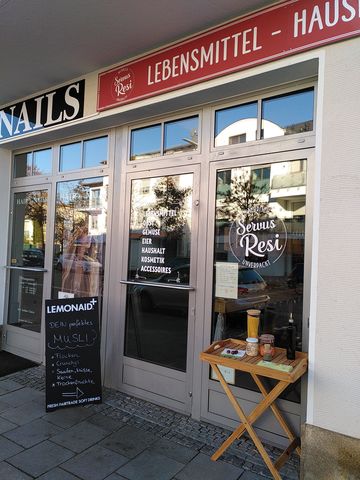
Gone the days of the pandemic spring and summer of 2020 when zero-waste groceries were blooming in town: Approximately at the same time as the Westend got its (now closed) neighbourhood shop, Servus Resi opened in Obersendling right before the lockdown in March 2020, in a non-descript middle of no-where near the Siemenswerke former industrial area. Don't let you fool by the uninviting environment at a noisy car road – what you'll find here is a busy neighbourhood gem nicely furnished in light wood, with a superb selection of dried herbs and spices aside the usual dry food, and a nicely arranged selection of household items. The greengrocery section is rather limited – local organic apples and potatoes in late autumn 2020 –, and there are no dairy or other food requiring cooling, but the shop offers both, liquid body care products and household chemicals from refill stations. Everything is supervised by the friendly shop-owner, Chrissy (not Resi) herself, and if you wish to get in touch with people from the neighbourhood take the burden to come here even from other parts of town.
In Laim Nebenan unverpackt ("package-free next door") followed in summer 2020. The latter is organised as a co-operative (though the location next to a co-operative bank is purely accidental) and sports a
small neighbourhood coffee place. They offer a very good selection of dry food, fresh fruit and veges, but less dried herbs and spices and no spirits. You can however buy wine and their selction of condiments and preserves in one-way glasses have the effect that you can do all the regular daily shopping here in one place if you don't come with more advanced expectations.
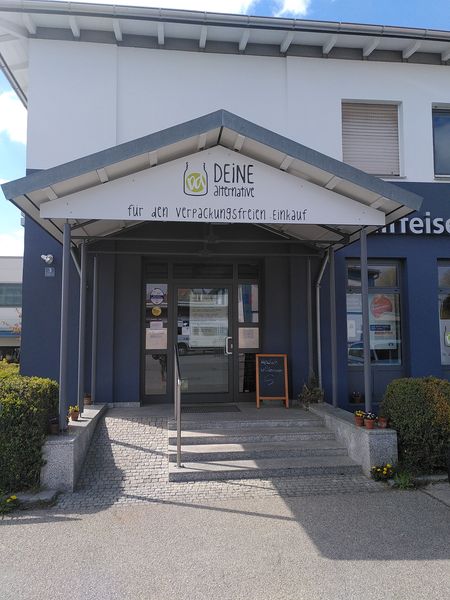
Half a year earlier, in January, 2020 another
co-operative, Deine Alternative ("your alternative") in Zorneding, opened on the premises of the former Raiffeisen co-operative bank, just a few steps from the urban train station.
When you get inside you will however immediately forget about its past as a bank, the shop is carefully and pleasantly decorated, with wooden furniture and equipped with a proper Italian coffee machine for a break in between. Most of the often local produce sold here is organically certified or at minimum sustainably produced, though it would be nice if conventional loose-weight products were clearly marked. In addition to the gravity bins and containers with dry food there's a decent selection of dried herbs and spices, sweets, bread, some confectionery, a small selection of fresh organic greens and veges, cheese and milk from the Nirschlhof organic farm (but interestingly enough no whole-meal flour or oils, vinegars or spirits by the litre). In a separate room you can buy toiletries, household chemicals and items supporting a zero-waste lifestyle. Everyone is welcome, but members of the co-operative pay less.
North of Zorneding, in the municipality of Poing, the co-operative
Bunte Bohne ("coloured/colourful bean") with its zero-waste supermarket cum cafe is facing a hard time as of June, 2023. Visit and support the place while you still can.
The neighbourhood of Trudering (a more than 1200 years old former village and suburb in the Eastern part of Munich) does not have a dedicated zero waste supermarket, but twice a month, on Tuesday afternoons, an indoor farmer's market dubbed Tante Trude ("Auntie Trudie") keeps popping up in the neighborhood associations' offices. Organic farmers offer local produce, and you can donate to the Trudelade project: home-cooked jam made from abandoned fruit trees in the neighbourhood (you'll get a jar as reward).
South-South-West of Munich, the city of Wolfratshausen (the endpoint of the S7 urban train) likewise sports a package-free shop centrally located at the Obermarkt market place: Ohnverpackt, another zero-waste shop opening within the corona lockdown in the spring of 2020,
is even certified organic. The few conventional products of regional origin are clearly marked as an exception. It does not only offer the usual dry food and household chemicals, but also a good selection of cheese and antipasti. What you won't find are fresh fruits and veges, meat and sausages.
There's a small day cafe, unfortunately all closed on Mondays.
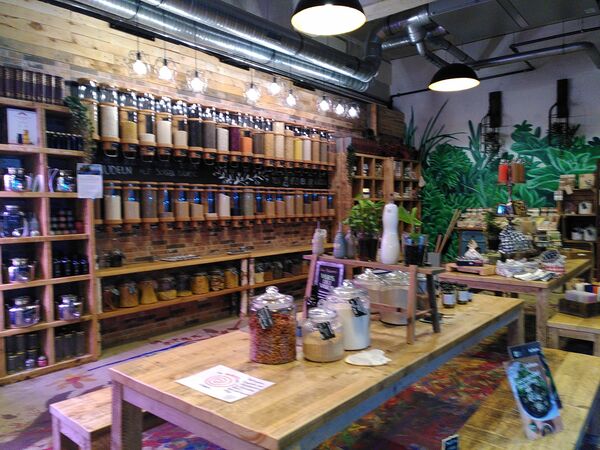
South of Munich, directly located at the S-Bahn station of Neubiberg the owner of the conventional Edeka supermarket opened a side project next door,
Hertscheck Unpacked which hopefully attracts people who usually wouldn't buy off the conventional supermarket tracks.
Although not marked most of the unpackaged dry food is organic – the shop assistant explained that since the shop itself isn't certified but fills the gravity bins and glass jars from bigger packages it isn't allowed to declare the products as "bio". There's also a good selection of loose-weight natural body care (both, in solid and liquid form) and household chemistry from brands I haven't found elsewhere. You can refill organic gin and regional (though not organic) whisky. The highlight of the shop are grow cabinets with special lamps where a good selection of herbs is grown, naturally free from agrochemicals. For city dwellers the place most certainly is worth
a bicycle ride (through the beautiful eco park Umweltgarten Neubiberg where an organic farmer's market is held on Thursday afternoons) or urban train tour even though the place has less liberal opening hours than the conventional supermarket next door.
Fun fact: The former premises of the Edeka supermarket now host a Vollcorner organic supermarket.
In smaller municipalities, (urban) train stations usually are the only public (and sustainable) transport hub and as such a natural place for zero-waste supermarkets. So I was glad to find a new (in 2022) co-operatively organised organic zero-waste supermarket in Unterföhrung, next to the S-Bahn train station. The shop dubbed
UFG (short for "unverpackt, fair, gemeinsam" – "unpacked, fair, together")
is open to everyone, with a 10 percent discount scheme for members.
It does not only offer dry food, condiments and household items, but also bread, rolls, cakes, dairy products and fresh, predominantly local fruits and veges. On Thursday afternoons you also may buy local organic meat and sausages, cheese and other fresh artisanal organic products from a mobile booth of the Tagwerk co-operative.
There's a small lunch cafe offering organic soups, quiches and sandwiches as well as cereal bowls, coffee, smoothies, tea and cake, all vegetarian, often vegan. Unfortunately you have to register with an app service to take your food with you in a returnable bowl or box, and nevertheless may have to come back to the shop to return it. So better bring your own boxes.
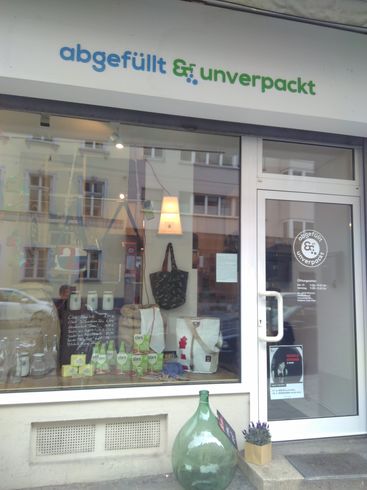
Plastic-free household
In March 2019 a tiny neighbourhood shop specializing in natural home cleaning opened in the Glockenbach neighbourhood: At Abgefüllt & unverpackt ("bottled and unpacked") the singer of the Munich-based band "Cat Sun Flower" warmly welcomes customers and passers-by and helps to (re)fill empty bottles with organic liquid household detergents. At the time of writing this shop was the only one in Munich selling washing powder by weight. In addition there are eco-friendly dishwasher tabs, body and hair soaps, fairly traded natural facecream in returnable glasses, towels, as well as upcycled and fairly traded bags and toiletry accessories.
About 20 years ago, Munich got its first – and to my knowledge only – organic department store centrally located a few steps from the Isartor: It consists of the city's first branch of the Basic supermarket chain with a self-service cafe on the ground floor and both, a self-service restaurant and a fashion and beauty store on the first floor. The latter,
Beauty & Nature, is a reliable source of organic clothes (with a focus on women and children), body care, home decoration, toys, dietary supplements and all types of sustainable household items including shoe shine, candles, seeds, cutting boards, or floor clothes.
Long anticipated, they started to offer refill for household detergents of the Sonett brand by the end of 2021, with a 10 percent discount. Since the staff is knowledgeable, friendly and helpful, do not hesitate to ask if you have any questions.
Supermarket chains
In autumn 2016 the local Vollcorner
supermarkets received an official permit by the Munich Department of Public Order (Kreisverwaltungsreferat) to fill customers' jars and boxes with
cheese, antipasti, processed meat products or cake. The Basic supermarket chain followed in summer 2017, while independent convenience stores often had done so anyway. What's missing are customers bringing appropriate containers or at least asking
the staff to fill their orders into returnable glass jars (Vollcorner, Lebascha and others) or stainless steel containers (Basic) provided by the shop itself. So be brave!
To avoid misunderstandings it is advisable to clearly point to your box (or ask for the deposit container) before placing your order at the sales counter and tell the staff to tape the receipt to it. Otherwise you may end up not sparing any waste: In the beginning the staff at the Basic butcher's disk would use the sheet of plastic-covered paper they'd usually wrap the purchase with to hand it over to you, along with the receipt taped onto the paper bag they otherwise would have used as outer packaging. In the mean time they got used to the procedure but were ordered to decline customer requests to buy meat this way. Since they started to provide stainless steel boxes for a deposit of 7 EUR there's however no excuse for one-way packaging here anymore. Artisanal organic butcher's shops will also fill meat into boxes you provide. The Herrmannsdorfer groceries (e.g. the one at Max-Weber-Platz) reward you with a few cents discount per saved packaging.
Until the end of 2022 Basic supermarkets had gravity bin dispensers for pasta, nuts, dried fruit, sweets, grains and more which all disappeared in the course of the company's
insolvency and take-over by the "teGut" chain. Package-free offerings at the remaining "Basic" branches are reduced to fruits and vegetables as well as food from the serviced bakery and butchers' counters.
The shops of the nation-wide operating Alnatura chain never offered refill dispensers. However, it has been increasing the range of products in returnable jars and bottles continously since 2021 – among others fairly traded nut butters, a number of dry products and even ketchup.
A small selection of dried fruits and nuts in refundable glasses as well as package-free toilet paper can be obtained from Vollcorner supermarkets. Their huge flagship store at Theresienwiese (with butcher's counter and lunch cafe) also experimented with a milk vending machine and a dedicated shelf offering all sorts of products in deposit glasses, but both efforts were discontinued due to low customer demand.
By the end of 2020 a number of conventional supermarket chains had introduced refill stations for dry food, too, but since you still have to do a lot of careful reading in front of the shelves to shop climate-friendly products, I won't mention them here, with one exception: the huge Tegut branch that opened in the Elisenhof shopping centre next to the main train station
in December 2020. This supermarket chain gives their customers a choice – all organic products are easily to recognise thanks to a light-green label on the shelves, and there's a great number of them in all product categories. Given the sheer number of products on sale the impressive refill rack at the left-hand side of the entrance aisle comprises only a negligible fraction of total sales, but it's a good start, and the best: All products in the gravity bins are organic. Come here for the biggest selection of package-free organic chocolate-covered sweets I've come across so far. There are grains, cereals, nuts, dried fruit, legumes and sweets, but no flour and surprisingly almost no pasta.
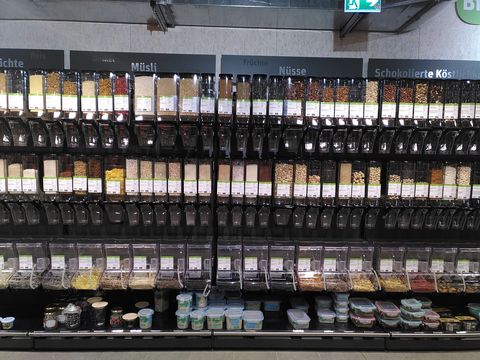
Although the supermarket has its entrance next to the Sunday-open (and if you ask me generally more pleasant) organic supermarket Biokultur in the Hauptbahnhof basement Tegut is closed on Sundays and public holidays as well as in the evening. When you have at minimum half an hour to change trains you will however reach to refill some of your dry food containers as long as you know how it works: Put your box onto the scales and choose "Tara-Bon". This will print a label. Fill the box and remember the product id on the lower end of the gravity bin. Put the filled box back on the scales and press the second "Bon" button beneath the "Tara-Bon" button. Now you will be asked to type in the product id. Scan the bar code on the previously printed label with the hand scanner, and there you go: A receipt with a price tag will be printed for you. Seal your box with this second label and hurry up to the cash counter.
Neighbourhood groceries
In Haidhausen the Lebascha neighbourhood grocery has been offering to fill all loose-weight products (cakes and bread, eggs, cheeses, olives, jelly gums and liquorice – note that the latter is not organic) in bottles, jars and boxes customers brought along. When the shop was taken over by the Ökoesel co-operative dispensers for grains, nuts and the like as well as household chemicals were added, and you can
buy all types of dried herbs and spices by the gram.
Ask for a deposit box in case you forgot to bring your own.
For home-made dried fruit stroll a few more steps down the street and see whether the Haidhauser Oase is open.
Household chemicals can be refilled at the Echt Bio Markt in Neuschwabing and at the Biochicco supermarket in the Au near Mariahilf-Platz. At the latter you can only refill original bottles of the Sonett label.
In Harlaching, the
independent Biowelt supermarket has a small zero-waste corner with dispensers for dry food, a good selection of loose-weight dried fruit and a dairy and butchers' counter where you can hand over your containers.
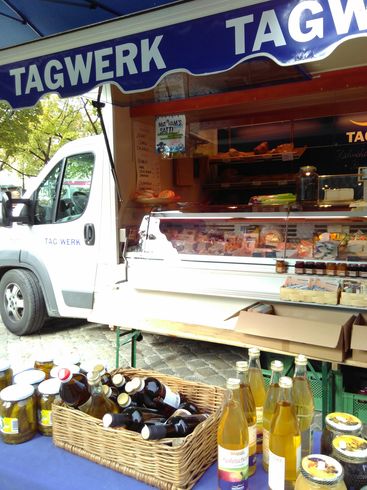
Farmers' markets
Once, sometimes twice a week farmers' markets are installed in many Munich neighbourhoods. Loose fruits and veges prevail here, and boothes selling organic produce (watch carefully for "bio" and "demeter" logos) will usually fill bread, cakes and pastries, antipasti, meat and dairy products into the containers you present. Notably at the boothes of the Tagwerk co-operative and the Hofbäckerei Steingraber you may be surprised to see that you're not the only one coming with her own boxes and jars.
On Saturday mornings you can find them next to the West-facing entry of Mariahilf church, in the neighbourhood of Au. Before the covid-19 pandemics all boothes (except the French fish monger) in the market block next to the church, right below the carillon, were organic,
but now it's no longer that easy. Therefore a comprehensive list: There are three organic market gardens (Biogärtnerei an der Isen alias Avanti Andi, Demeterhof Fahrenzhausen alias O'is bio and a third one also selling flowers and seedlings which you will immediately recognise when greeted with a friendly French accent). Put differently: Simply avoid the biggest greengrocery booth, "Helminger".
For meat, sausages, cheese and other dairy products there are the aforementioned two producers, and in addition the farm sale of Bergwinklhof Monigottsöd. The latter also offers a small selection of wine, but for good and knowledgeable advise on wines or non-alcoholic drinks to accompany a meal you'll better pay a visit to Uli Scheffler's organic wine trader's booth. While the juices are readly available in deposit bottles, returnable wine bottles are still very rare, and not used for high-quality wines.
If you feel adventurous on Thursday afternoons take the urban train S7 in direction Aying/Höhenkirchen-Siegertsbrunn/Kreuzstraße (or a bike ride) to the suburb of Neubiberg and pay a visit to the communal organic market on the pleasant premises of the Umweltgarten eco park, a true oasis within ugly suburbanity, with a small zoo, popular not only among kids. On Thursdays there's also an all-day market at Rotkreuzplatz. As on Mariahilfsplatz about half the boothes here are organic, though scattered all over the market area, with a cluster in direction Nymphenburger Straße.
Needless to say that the organic boothes on the famous Viktualienmarkt in the Munich city will happily support you when you make it clear that you want to use your own bags and containers. And the spring of 2021 did not only see the opening of an organic bakery in one of the solid market stalls in the northern part of the market, but also a tiny organic food shop for organic dry food grown and produced in the nearby Chiemgau region:
Satt und gut ("full and good") sells staple foods like grains, flour, eggs, honey and oil but also cookies, both pre-packaged and loose weight, partially from the smallest gravity bins I've seen so far. Note that this shop, unlike the market itself, is closed on Mondays
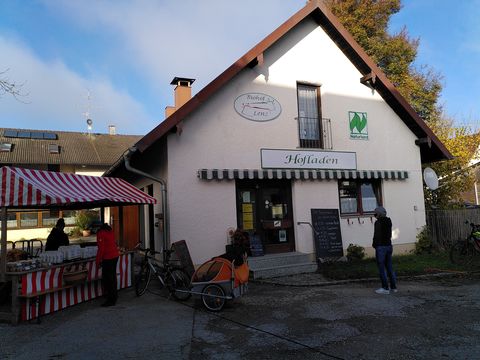
In Zorneding a small farmers' market is being held every Friday on the premises of the Biohof Lenz organic farm. Here you can buy local organic meat and meat products, cheese, bread, veges, and occasionally honey and bee products, wines and spirits. Although most stalls are organic there are a few exceptions offering conventionally produced specialities. The Lenz family's own farm shop keeps open at the same time and on Saturdays, but for buying their exceptionally good meat you should subscribe to their newsletter and order beforehand according to availability (you should be fast to answer). Unfortunately all the Lenz meat and sausages are vacuumized in plastic.
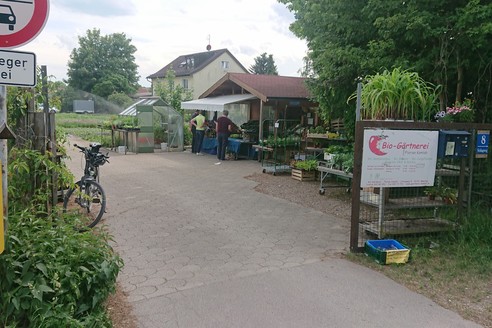
At the Western edge of town, in Pasing the organic market garden of Bio-Gärtnerei Kamlah has a farm shop open on Monday, Wednesday and Friday afternoons. You can not only buy salads and vegetables grown here but also organic seedlings for your balcony or garden patch. The farm has also a market stall at the Pasinger Viktualienmarkt which keeps open all days except Sunday offering a huge selections of organic fruit and veges, but no seedlings.
Tea shops
While coffee is readily available from
loose weight convenience stores, tea drinkers aren't well catered for: Usually you will find some tisanes and one or two types of black tea. Fortunately specialist tea shops still exist, and as they sell loose weight teas by the gram don't be shy and ask them to fill your tea box.
In the
Tee Gschwendner shop in the Asamhof backyard a few meters from the new pedestrian street of Sendlinger Straße this will work as long as the opening of your jar or box is wide enough for the shop assistant to fill it without touching it with her shovel. The franchise also sells conventional fare, so make sure to insist on organic quality – "Bio-Qualität" is the keyword. You'll find a decent selection of both, green, black and herbal teas, with and without aromatics. Bring a little time to stroll through the light and pleasant shop that has been at this place since the 1980ies, ask the assistant to show and suggest teas according to your taste and tell a little detail. When all your teas are filled into your jars you will be asked whether you fancy a tea sample, so it is smart to bring an additional small glass or jar.
Mind you that green tea doesn't store well in classic metal tea boxes as this material supports further oxidation processes.
In spring 2022 it turned out to be difficult to buy loose-weight organic flavoured tea as compliance to the EU regulation 2018/848 on organic products had not been established in time.
Coffee and food to take away
An increasing number of coffee places you may lend a Recup coffee cup for a deposit which you can return at any other shop participating in the retour scheme.
Some like the Neulinger bakeries will even give you a small discount for sparing the environment.
Most of the eateries reviewed here will fill your food into the boxes you provide for take-away as long as you make this clear before they start their usual routine which still means one-way packaging. Sushi to take away is available from Sushiya, and they will happily accept your bento boxes with your order.
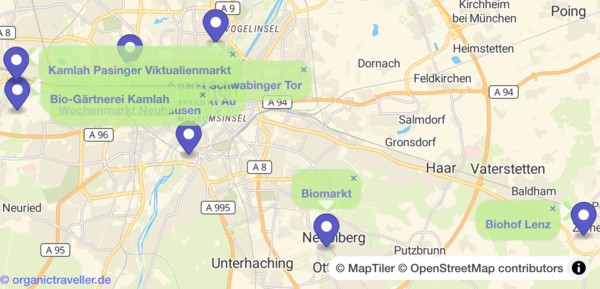
Closed
- Der plastikfreie Laden, Schlossstr. 7 (Munich's first zero-waste shop, also known as "Plastikfreie Zone", now online only)
- Mutternaturladen, Grünwalder Str. 244
- Mutternaturladen, Tumblinger Str. 45 (inside the Bahnwärter Thiel area
- Ohne, Schellingstr. 42
- Ohne Haidhausen, Rosenheimer Str. 85
- Naturverpacktes Westend Pur, Heimeranstr. 51a
- Evis – ab ins Glas, Pollinger Str. 11, Gilching
- Lela Lose, Freisinger Str. 3, Erding
2024-03-24 11:30:00
[Munich, Neubiberg, Erding, Gilching, Poing, Trudering, Unterfoehring, Wolfratshausen, Zorneding, Au, Haidhausen, Harlaching, Laim, Maxvorstadt, Pasing, Westend, organic, vegetarian, zero_waste, unverpackt, cafe, grocery, market, supermarkets, lunch, bakeries, butcher, tea, bodycare, household, sushi, wine]
Link

Sunday, 10 March 2024
To find a self-respecting restaurant or supermarket snack bar not equipped with a restaurant-size Italian espresso machine can be difficult, and even the tiniest organic corner shop will try to offer you ubiquituous Italian-style coffee drinks. Likewise you can have organic tea bag teas and infusions of usually decent quality. But for the modern nomad on the job, the afternoon chat with friends or the traveller in search of a undisturbed place for a break or observations, the dedicated coffee or tea house is a far more appropriate place to spent hours.
Common for all the places listed here that they are closed in the evening – usually around 6pm, some keep open until 8pm. Note that weekend opening hours may be even more restricted.
Viennese-style coffee houses
The headline is misleading – even if an increasing number of cafes see themselves in the tradition of Viennese coffee houses when it comes to the stuccoed interior, the dark wooden furniture, a selection of daily newspapers as well as the menu, they will usually serve Italian-style coffee drinks. The perfect place for breakfast and a coffee break at any time of the day, you will also be served lunch and snacks throughout the day. Expect however to order more of the deliciously handcrafted cakes than you initially intended to.
To my knowledge the only one left by the end of 2020 and my absolute favourite is the newly restored Cafe Reichshof in Haidhausen, covered in detail in my ice-cream post.
Oriental-style coffee
Since Iunu stopped serving Turkish mocca the only place offering responsibly sourced oriental-style coffee in Haidhausen is Saladins Souk with its rather irrational opening hours. If it is closed you may move next door to Erbils vegan Turkish eatery.
In autumn 2021 I noticed to my delight that these aren't the only mocca places anymore: The Icedate ice-cream parlour in Maxvorstadt started serving organic coffee, although the price tag of 2.40 EUR the mocca is rather stiff.
Italian style bars
Pop in, have a coffee, a chat, a sweet, and pop out again – the Italian bar is the hotspot of a neighbourhood. To my deepest regret its Bavarian incarnation is no more (landlord cancelled contract with the coffee roastery), but
in the middle of humming Viktualienmarkt market North of the crossing Reichenbachstraße/Frauenstraße there's Kaffeerösterei Viktualienmarkt, a vibrant market booth with bar tables under a roof. So even if the weather is bad and you're outside there's no reason to give up plans for an Italian style coffee drink made with sustainably sourced (though not organically certified), locally roasted coffee. The milk is organic and comes from traditionally working mountain farms in the Berchtesgadener Land district, packaged by the co-operatively driven Berchtesgadener Land dairy which, in 2017, banned the use of glyphosate for all its farmers, not only the organic ones.
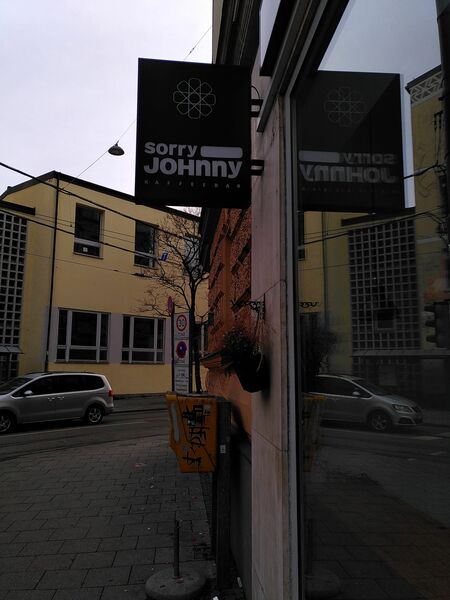
If you prefer your coffee with biodynamic (Demeter) milk head for the Sorry Johnny coffee bar in Haidhausen, conveniently located at the Wörthstraße tram stop. The place has quite unusual opening hours: closed on Tuesdays and Wednesdays, and open during the early evening
on Fridays and Saturdays. The bar replaced a vegan clean-eating spot in autumn 2021 which, for a while, prepared my favourite oat-based latte – a coffee preparation that's still available here.
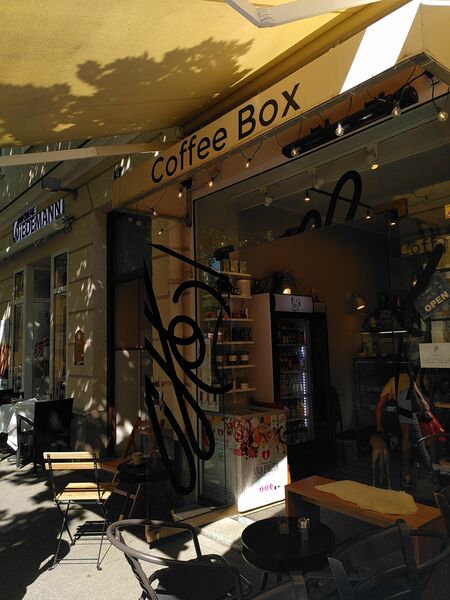
Without the heavy car traffic the area between Max-Weber-
and Wiener Platz could be a lovely urban hideaway, with singing tram tracks, an underground station (exhibiting Munich's first horse tram), pleasant shops, cafes and nearby parks. To escape from the agressive passive motorised mobility along Innere Wiener Straße jump into quiet Steinstraße and take a breath at the tiny
Coffee Box cafe. Although some of their coffee is roasted by
Merchant & Friends in Glonn, none of the
beans served here are organic. The milk, however, is organic, as is the ginger and pomegranate juices used in some drinks. For a refreshment in the summer heat have an
organic, vegan popsicle.
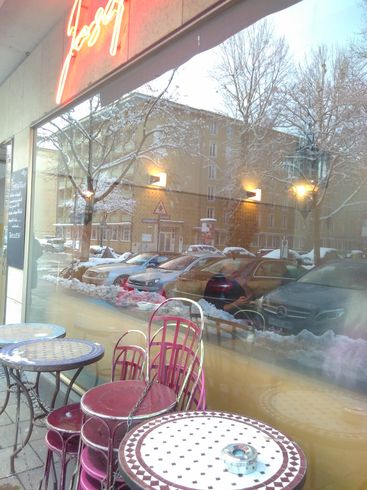
(Almost) fully organic
If all you want is a place where you do not have to fine-read the menu to pick out the organic items your options are limited to the afore mentioned Café Reichshof, near tram stop "Wörthstraße") – and to Café Josefina in the legendary neighbourhood of Schwabing with its bohemian past, a few steps from tube stop Josephsplatz.
A cosy day cafe serving Italian-style coffee drinks made with real milk or a number of plant-based alternatives it's not only worth a coffee but also a lunch break. Although nearly all ingredients are organic there are a few exceptions when it comes to the cold cuts used in Italian-style sandwiches. As early as half past seven the place starts serving both, vegan, vegetarian, and omnivore breakfast on weekdays, and since it is quite small it's advisable to reserve a table if you plan to step by on a weekend.
For a fully organic breakfast or coffee near Münchner Freiheit head for the small artisanal (and fully organic) Brotraum bakery happily catering for early birds. The breakfast menu is simple – but you can order additional items like eggs and cream cheese on top or ask for a freshly prepared sandwich or roll of your choice. Don't forget to bring your own bags and containers when you come here to buy bread, rolls or lunch items for take away – the owner is inclined to support your zero waste efforts.
In Neuhausen, about half a kilometre from Rotkreuzplatz a gorgeous health-food eatery cum cafe gROOSartig (a play on the word "gorgeous" and the name of the owner) opened in 2020, offering breakfast, lunch, and coffee breaks based on regional, usually organic, often fairly-traded ingredients. Although the menu is planned with a focus on healthy food the demand for sweets and cakes has resulted in an increasing range on cakes and tarts.
The place also has a small shop offering plastic-free artisanal household items.
Shabby chic and homely places
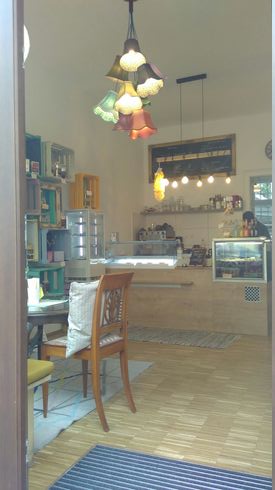
A small cafe of old, run as a social enterprise just a five minutes walk away from Rosenheimer Platz, Cafe Plaisir moved to a bigger and lighter venue in 2018 – and stopped using organic ingredients for their home-made ice-cream, chocolates, cakes and cookies. Still, tea and coffee drinks and a few more items are marked on the menu with a little heart denoting organic, and eggs – where marked – come from organic farms raising both, the hens and their cockerel brothers. Be patient and kind if the serving personnel does not respond immediately – the shop is a social enterprise run by longterm-unemployed persons.
Not far from Ostbahnhof station Kosy*s cafe promises to be "your second living room". As long as you have some tolerance towards cake stands filled with kitschy sweets guaranteed free from natural colourings and a decidedly vintage feel you can have an organic tea or soft drink, a coffee drink made with organic milk, organic eggs and cereals for breakfast or a hearty lunch often entirely made from organic ingredients in a leisurely atmosphere. The good thing is that organic ingredients aren't shamefully hidden – when it's organic they'll make it transparent on the menu. The bad news: their homemade cakes unfortunately are not organic, not even the eggs.
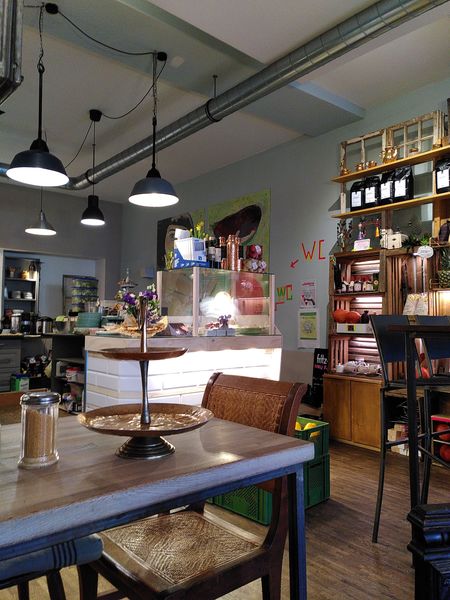
A few steps away, directly located at Orleansplatz cafe Iunu is a perfect place to meet a friend for a chat or to have a recreational coffee break including a chat with the friendly owner. Some of the coffee, the milk, the tea and a few staples used in the daily changing vegetarian and ayurvedic-inspired lunch set menu like agave syrup, rice and vegetable yogurt alternatives are organic, but unfortunately usually not the veges. The place was my joker for the best Turkish mocca in town, but unfortunately it is no longer being served due to marginal demand. With a small but carefully chosen (though not necessarily organic) range of delicatessen Iunu will also save you when in need for an unplanned last minute gift. On Saturdays the cafe is often unexpectedly closed due to arrangements, so check in advance.
Another cosy living room dubbed Zimtzicke is tucked away in comparatively quiet Elsässer Straße, only a five minutes walk from Ostbahnhof. All their teas, coffees, the milk and eggs are organic. Their lunch dishes, although mainly not organic, are tasty. However, when I enquired about the ingredients of the individual dishes on the menu, the staff wasn't able to tell whether they contained organic ingredients. The tiny place smells lovely of home-make cakes, some of them vegan. A perfect location to warm up after a winter walk in the city, and a pleasant retreat to welcome spring or to enjoy a summer day in the city on a table in front of it.
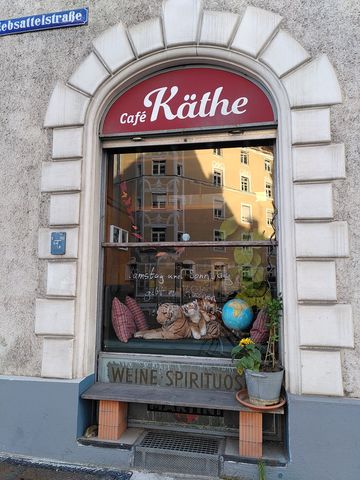
Another option to mingle with natives is a homely shabby chic neighbourhood cafe cum gallery in the neighbourhood of Au, on the Eastern shore of river Isar near Deutsches Theater. The audience of Café Käthe is mixed, coffee, milk, tea, rolls and cakes as well as most of the softdrinks are organic. They don't serve hot food, but you can have breakfast, sandwiches, cereals, salads and - of course – cake all day. Many but not all ingredients are organic, so ask if you care but be prepared that the service personnel isn't prepared to answer on the spot.
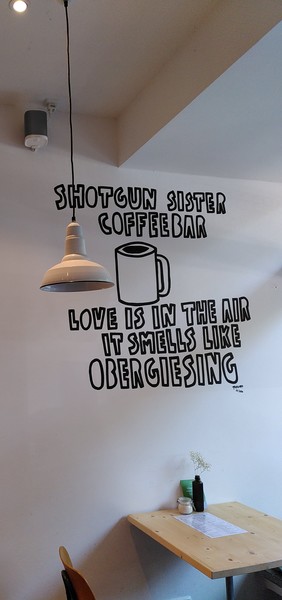
A crowded neighbourhood coffee bar in Obergiesing, Shotgun Sister allows you to meet people from the former working class borough which has been popular among both, students and families alike. All food including the cakes are home-made, with organic fruit and veges, often from local biodynamic agriculture. The cakes are fully organic. If you cannot spot the place at once watch out for the branch of the organic Hofpfisterei bakery chain which is located next to it, a five minutes walk from Giesing station. If you like splash out a coffee on an unknown – as the sister participates in the Hey campaign for fellow citizens in need. Needless to say that vegan and gluten-free options are readily available.
Big enough to almost guarantee a free seat for the visitor-by-chance is Cafe Katzentempel in the Maxvorstadt university quarter. You must however not suffer from a cat allergy as this rather special vegan place is inhabitated by six cats, and the once nice wallpaper on the wall with the scratch pole facing the entrance has already become rather shabby. Most of the softdrinks are organic as are all soy products and the cow milk (on request used for non-vegan coffee and tea-based drinks). The place offers an impressive range of organic nuts and grain milks to be ordered for your latte. The food and home-made cakes may include additional organic ingredients, although they aren't generally organic, just of local origin if possible. Students and apprentices are entitled special prices Tuesday through Friday, and free wifi is available. Depending on your table you may find the slightly aggressive sales presentation of the Katzentempel brand t-shirts disturbing – overall a place to either love or detest.
Further along Türkenstraße you'll find Mr. Ben – a small coffee cum snacks place offering (herbal) tea and soft drinks in organic quality. Unfortunately neither the coffee artisanally roasted in the neighbourhood of Giesing nor the milk and oat milk are organic.
There's a small selection of Italian-style piadina sandwiches and freshly home-made cake which occasionally may contain organic ingredients. The croissants used to come from an organic bakery a longer bicycle ride out of town but they were sold out (just like the veggie piadina) when I was there. Orders should be placed at the bar, but you will be served, and return to the bar for payment, preferably (and if the sum is smaller than ten euros only) in cash.
If you prefer strictly vegan places for a coffee break try Siggis which I reviewed here.
Self-service coffee house and deli bars
For the no-frills coffee with WLAN or on the go a number of nation-wide operating self-service coffee house chains serve Italian and American-style organic coffee often with organic milk and some more organic items like tea, soft drinks or fruit and nut bars. The market in Munich is quite volatile: The once dominating franchise San Francisco Coffee Company filed for bankruptcy during the covid-19 pandemics and does no longer have stores in Munich. Black Bean never expanded and survived, and Coffee Fellows is now ubiquitous, serving coffee at (among others) fuel and train stations.
Once booming MyMuesli chain, a German web order shop for organic cereals and porridges with offline branches throughout the German-speaking countries also had to close a lot of its shops after
a rapid, unhealthy expansion strategy.
On the Eastern edge of Viktualienmarkt, a few steps from Marienplatz you'll still find their flagship store which includes a decent coffee bar. No cakes to be had here but Italian style coffee drinks, juices, and of course mueslis, porridges and cereals in case you are a little hungry or in need for an organic breakfast. The major aim of the shop is of course to sell their products but for a quick WLAN or coffee break in the busy heart of the city the functionally styled place isn't a bad option.
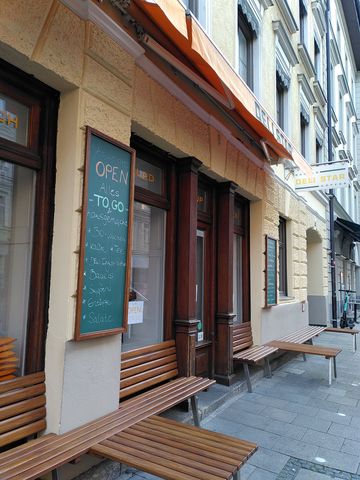
My favourite in this category is a small organically certified Munich-based chain: Deli Star brings the spirit of New York-style deli and coffee bars to town, but with a strong focus on the environment: No plastics here, all take away stews and salads come in returnable glass jars, and the coffee on the go in a Recup deposit cup if you don't bring your own. Not every ingredient in their bagels, sandwiches, stews and salads is organic, but all regular organic items are clearly marked BIO on the menu: the cakes (though not the muffins and brownies), most meat products, yogurt, Lemonaid and Adelholzener fruit and soft drinks. Other ingredients like veges and cheese may or may not be organic. The coffee isn't organic, but the milk comes in huge reusable containers from a local organic farm. In general they use a lot of products grown and produced in the region and/or from small-scale manufacturers. Both branches are located in students' hotspots in Maxvorstadt: near the University and at the entrance to the Englischer Garten park.
Mingle with the working crowd
Campus canteens and coffee bars frequented by those working nearby are excellent places to get in contact with locals – with the disadvantage of opening hours following office hours.
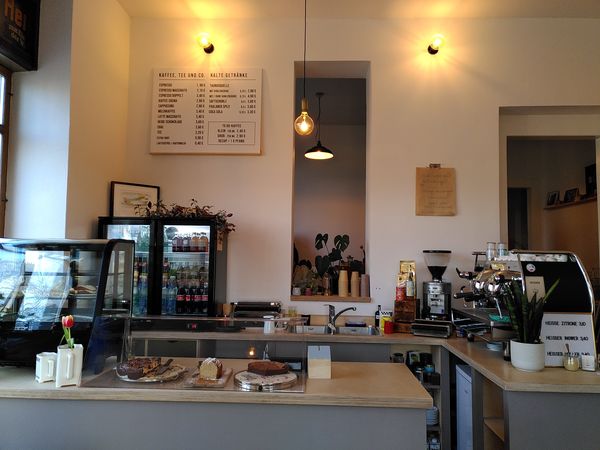
On the eastern side of the railway tracks of Ostbahnhof train station, a few minutes north of the newly developed Werksviertel you'll find day cafe Louka, a friendly no-frills place mainly catering for the office workers and craftspersons working nearby. What you get here:
coffee, home-made cakes and sandwiches, a
daily changing soup and main course, often vegetarian.
If you want to taste simple German everyday standards like Kässpätzle and Schupfnudeln, or the Russischer Zupfkuchen ("Russian pluck cake") cheesecake, this is the place. Not everything is organic here, but both, the coffee, the milk and the plant-based drinks, the eggs, often the veges and the meat are.
Steinhausen is most certainly not a neighbourhood you will have on your travel agenda, but if you come to the Berg am Laim urban train, bus and tram stop the coffee bar on the ground flour of the Süddeutsche Zeitung publishing house is nearby and open to the public. It offers organic and fairly traded coffee and organic lemonades at very competitive prices. Milk, soy and oat drinks are occassionally organic, but better check for the "bio" keyword on the packs as conventional industrial milk still prevails. The sweet and savoury snacks are of unknown provenance so you may prefer to ask. Salads and desserts are being sold in retour jars at a deposit.
If you wish to mingle with journalists, developers, printers and all those involved in the production of Germany’s most respected daily newspaper this is the place despite the surroundings.
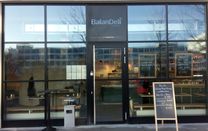
If you happen to strand in the urban desert of office blocks between the tube stops of Karl-Preis-Platz and Sankt-Martin-Straße head for the Neue Balan campus, a former industrial area where in the past Siemens produced semiconductors. Quite centrally you'll find Balan Deli, a modern yet comfortably furnished day cafe run as a not-for-profit company providing fair employment for an inclusive team of people with and without handicaps. The cafe was founded by the nearby inclusive Montessori school and designed by a Hamburg based artist. You can have a healthy lunch, partially based on organic ingredients, or simply an organic coffee, tea, wine or soft drink, often sourced from local producers, in a pleasant environment. The bread for the sandwiches comes from a local organic bakery. Unfortunately the service staff is not very knowledgeable (yet) about organic and sustainably produced food (when I enquired about the milk they told me it was organic although they actually use the cheaper conventional product of the Berchtesgadener Land dairy which also offers an extended range of organic dairy products), but was happy to ask the kitchen staff about the origin of the chicken in the Thai curry (which was not organic).
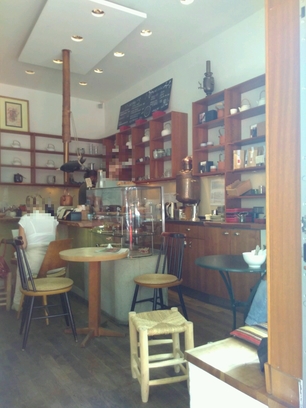
Tea houses
For those seriously into tea the ultimate target in town is Tushita Teehaus in the Glockenbach neighbourhood, near the Western exit of tube station Fraunhofer Straße (and a five minutes walk South of Gärtnerplatz). To taste their around 150 organic and often fairly traded tea and tisane varieties (which aren't exhaustively listed on the menu) can take some time, but you can buy them to take with you. With every order the staff will hold a microscopic tea ceremony for you, and hot water for a second extraction is served in a small thermos aside. In the past they often used too hot water for some of their delicate green teas resulting in a bitter beverage, but this fortunately had changed to the better at my last visit. In addition they serve small vegan dishes as well as yummy home-made cakes, all organic, and there's a Japanese touch to both, the decoration, the food and the subtle focus on Japanese tea and matcha. Consequently the place is frequented by visitors of Japanese origin as well as the occasional Indian gentleman or the German hippie or university professor reading their daily. Given how frequented the place often is there's a quiet, pleasantly concentrated atmosphere to it.
More to try
In the Westend, a few steps from Theresienwiese (and the Emilo cafe)
Café Gollier is a pleasant neighbourhood day cafe, popular for breakfast and hearty lunch. They promise to use regional, preferably organic products according to availability, but so far I have not had the chance to eat here.
Closed
The following places ceased to exist, although you still may find references to them on the web:
- Contains Coffee, Celibidacheforum
- Echt jetzt, Barer Str. 48 (web shop remaining)
- Emilo im Glockenbach, Buttermelcherstr. 5
- Emilo Westend, Gollierstr. 14
- Emilo am Odeonsplatz, Odeonspl. 14
- Emmi's Kitchen, Rosenheimer Str. 67 (vegetarian cafe cum eatery)
- Epique Raw, Max-Weber-Pl. 11 (vegan patisserie shop-in-shop)
-
Fritz Brotbar, Nymphenburger Str. 154 (bakery cum cafe)
-
Fritz Mühlenbäckerei, Müllerstr. 46 (cafe cum eatery, re-opened in 2020 as bread bar w/ show bakery)
- Himmelherrgott, Waldfriedhofstr. 105 (cafe)
- Die Kaffee-Küche, Weißenburger Str. 6 (cafe)
- Kafehaus Karameel, Nymphenburger Str. 191 (Viennese-style coffee house)
- Lolas Eckcafé, Metzstr. 37
- Kaffee Sonnenschein, Gietlstr. 17
-
San Francisco Coffee Company, Nymphenburger Str. 151 (cafe)
- San Francisco Coffee Company, Innere Wiener Str. 57
- San Francisco Coffee Company Ostbahnhof, Orleanspl. 5a
- San Francisco Coffee Company Riem-Arcaden, Willy-Brandt-Pl. (cafe)
- San Francisco Coffee Company Maxvorstadt, Türkenstr. 47 (cafe)
- San Francisco Coffee Company Odeonsplatz, Theatinerstr. 23 (cafe)
- Black Bean, Amalienstr. 44 (cafe)
- MyMuesli München-Pasing w/in Pasing Arcaden, Josef-Felder-Str. 53 (muesli shop)
- MyMuesli München OEZ w/in Olympia-Einkaufszenrum, Hanauer Str. 68 (muesli shop)
2024-03-10 21:00:00
[Munich, Au, Haidhausen, Maxvorstadt, Schwabing, Westend, Englischer_Garten, organic, coffee, tea, breakfast, lunch, snacks, fair, vegan, gluten_free, cafe, ice-cream, restaurant, American, Italian, Japanese]
Link







 Another organic institution of old is
Another organic institution of old is 
































